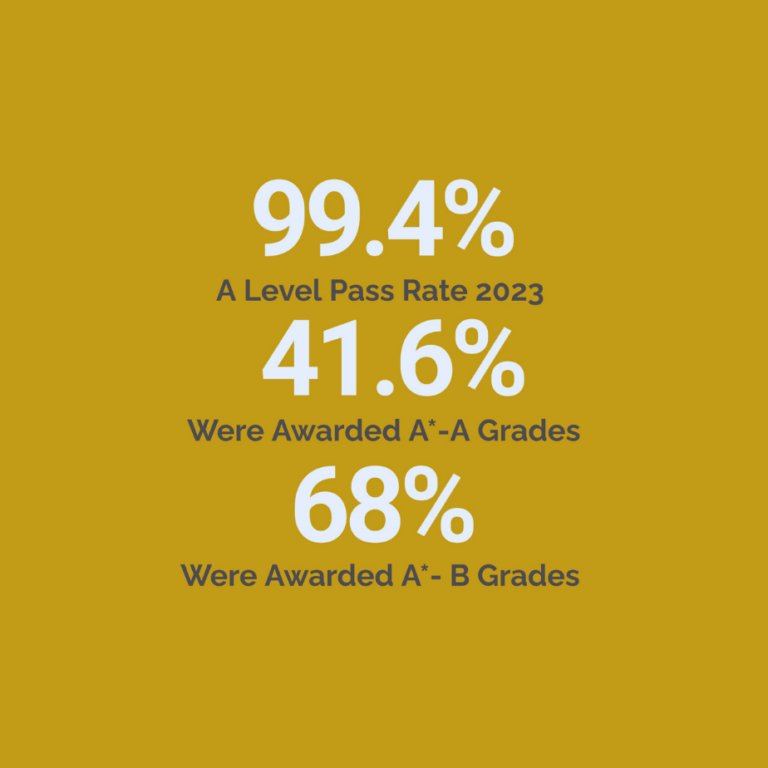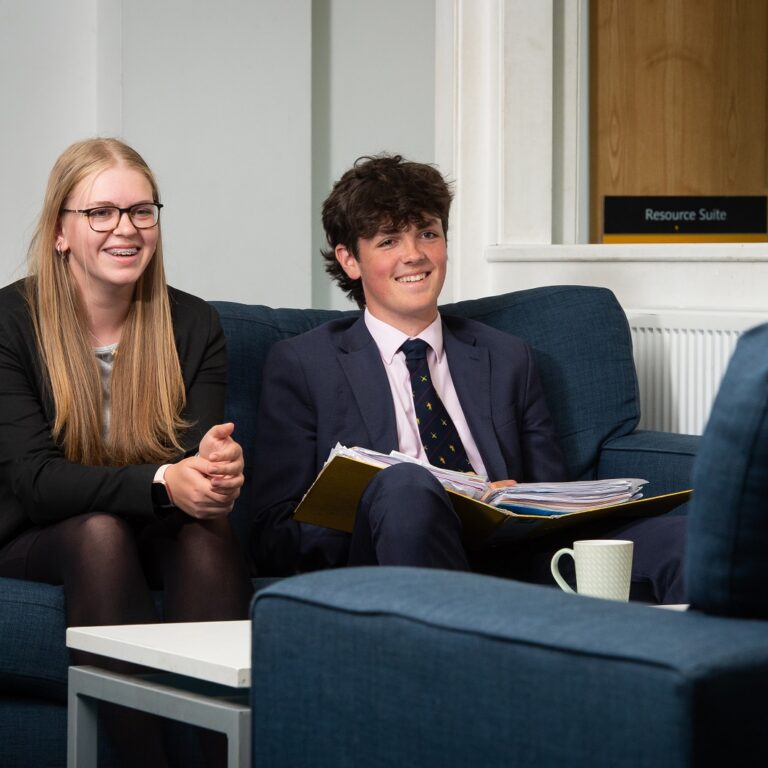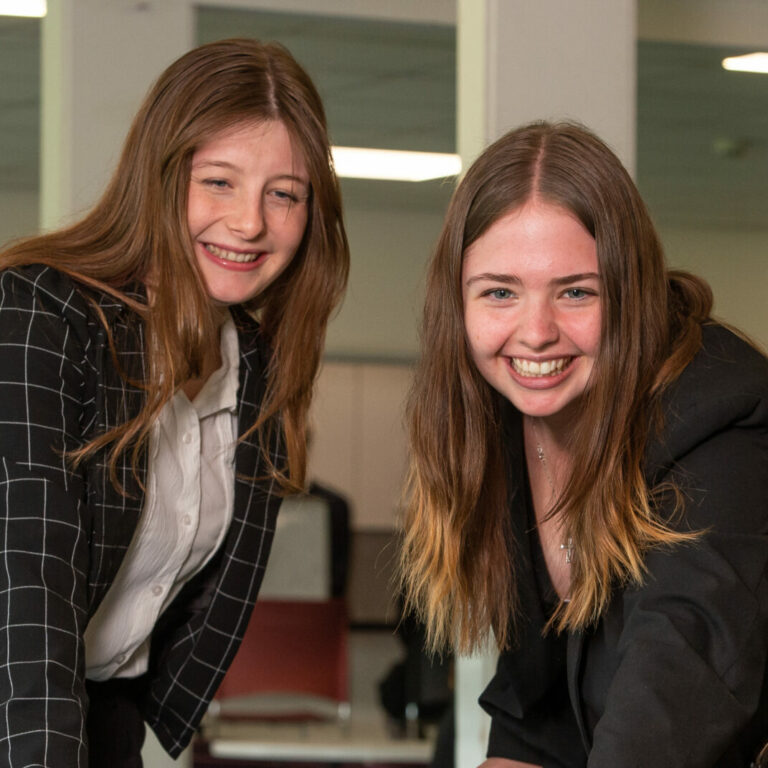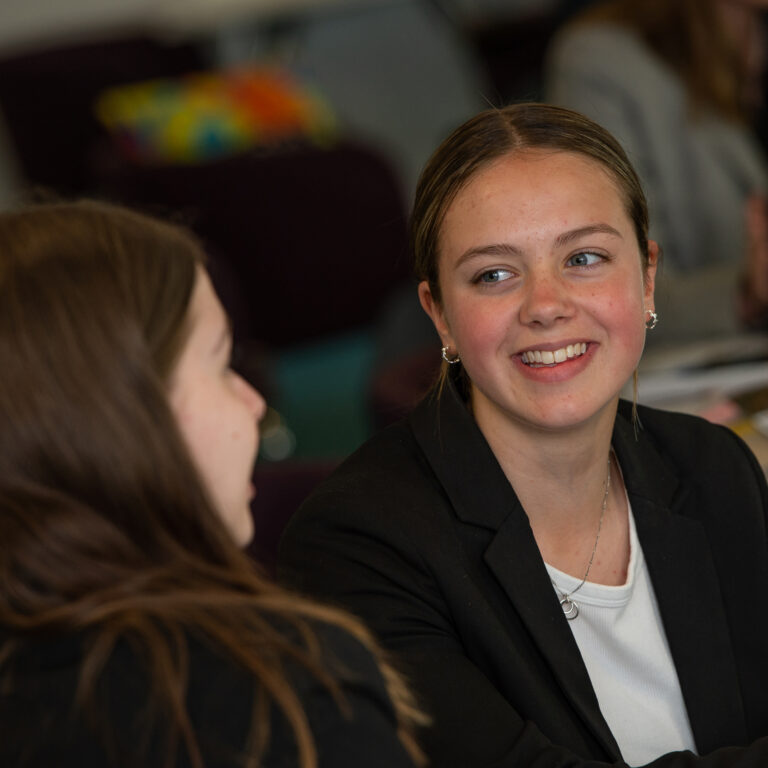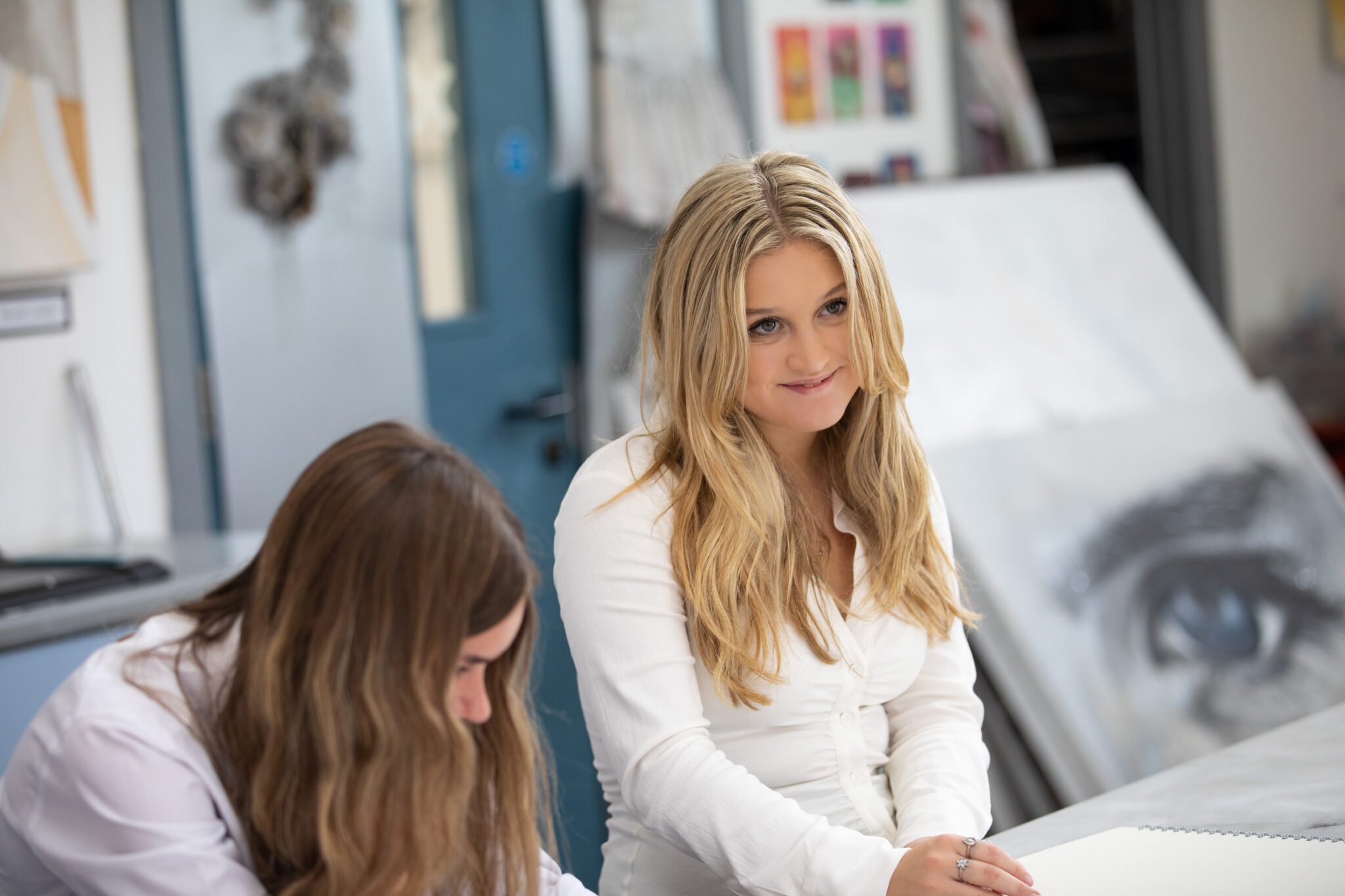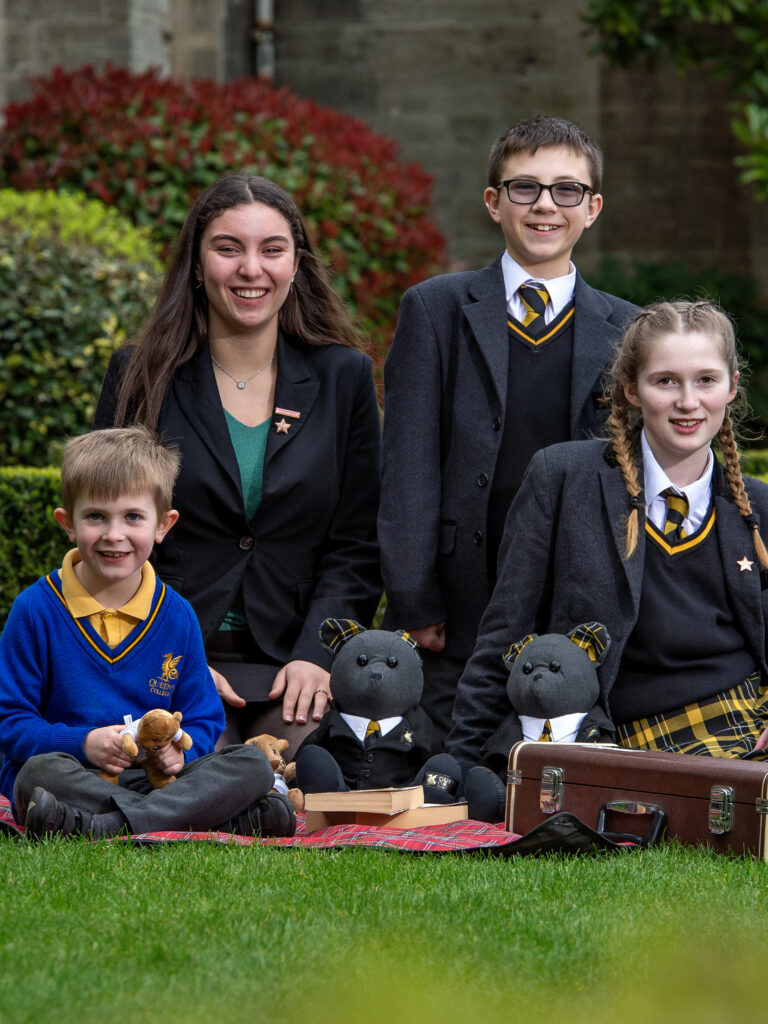We offer a diverse range of options in addition to A Levels, such as Level 3 Diplomas and BTECs which are all equivalent to one A Level. We also encourage students to broaden their skills and knowledge beyond the traditional curriculum, preparing them for the challenges of university and the workplace by offering a range of activities including the Extended Project Qualification and the Queen’s Diploma.
A Level Art and Design
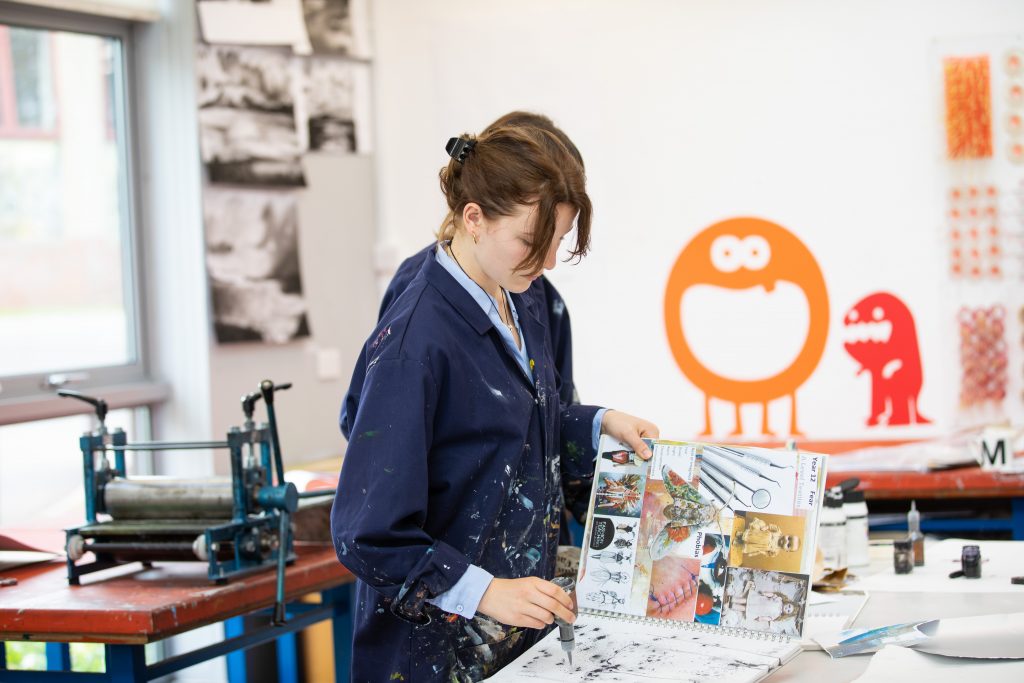
A Level Art and Design
Overview
Creativity is becoming one of the most important skills in today’s society. The future is constantly changing to adapt to developing technology and a pupil’s ability to think creatively and innovatively is increasingly important. The Drama and Art Building at Queen’s College offers some of the best facilities in the South West. The spacious, superbly lit studios offer specialist teaching facilities for fine art, printmaking, photography, textiles and ceramics. There are well equipped rooms for GCSE pupils whilst each A Level pupil has their own exhibition and working space. Head of Department, Rebecca Cade, Teachers of Art, Laura Burgoyne and Sandra Spall, and the Art Technician, Alison Luisi, have specialisms in textiles, painting, printing, ceramics and mixed media, and are all practising artists.
Why Study?
The A Level course builds upon knowledge, understanding and the development of skills through research, drawing, design development and critical and contextual understanding. You will generate practical work, ideas and research from primary and contextual sources and then present your outcomes based on themes developed from personal starting points. In the second year of the course there are two linked elements, each with separate final outcomes – practical work and personal study. The development of these is shown through supporting studies; your innovation and creativity will be essential as will be your own, strong, personal identity. The externally set assessment is again based on one broad based thematic starting point and plenty of guidance is given to you through the preparatory period.
Course Overview
Our topic lists change every year; this enables us to keep our ideas fresh and to keep us up to date with what is going on in the world around us.
Course outline:
• 60% coursework
• 40% Exam- The exam is a practical 15 hour timed
test
Progression
A University course in a creative subject will require the creation of a portfolio. Taking 1 or more of our A Level subjects will prepare them for this stage, and we will support them with this. We have had pupils move on to a variety of different creative areas including Architecture, Art theory, Illustration and many more. Many of our pupils have progressed from A Level to study creative subjects at a variety of institutions, including Central Saint Martins, Kingston, Falmouth, Edinburgh and Glasgow. We are incredibly proud of all our pupils and their achievements to date, at Queen’s and beyond.
A Level Biology
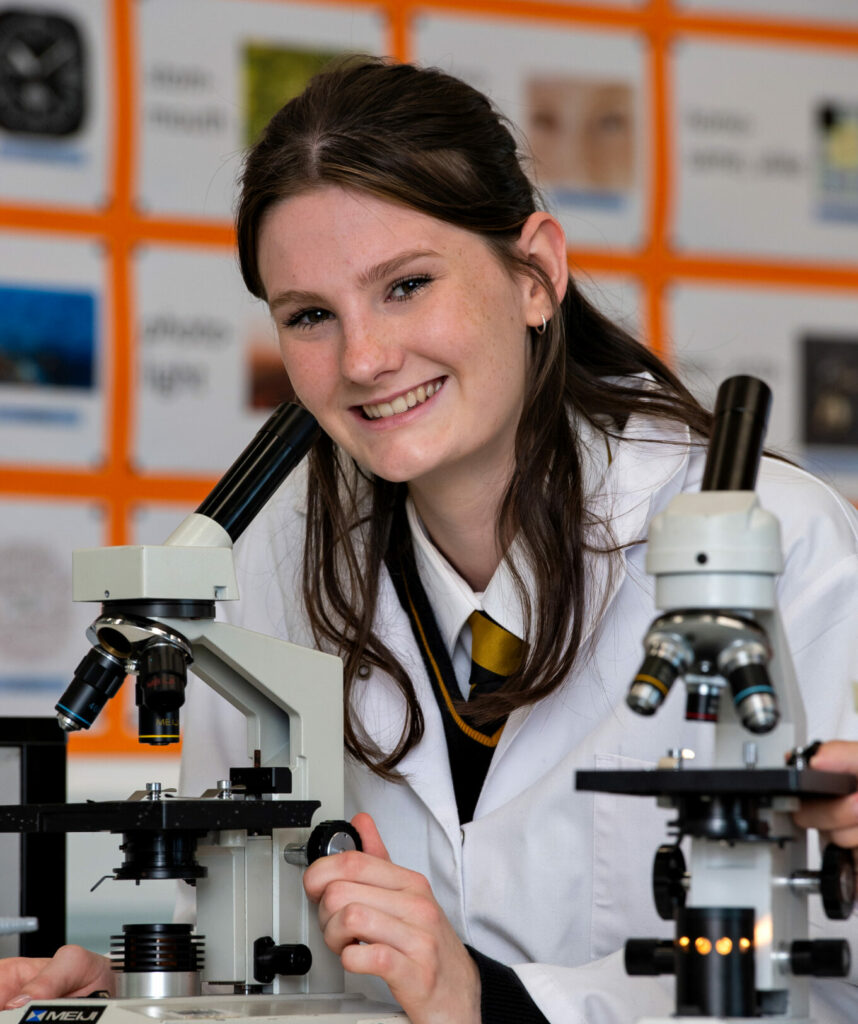
A Level Biology
Overview
Biology A-Level will give you the skills to make connections and associations with all living things around you. Biology literally means the study of life and if that’s not important, what is?
Why Study?
Being such a broad topic, you’re bound to find a specific area of interest, plus it opens the door to a fantastic range of interesting careers. Salters-Nuffield Advanced Biology (SNAB) looks at Biology through up-to-date real-life contexts and makes innovative use of ICT. We use traditional teaching methods, practicals and the resources and teaching animations from the SNAB online website to cover the course content in an exciting and novel way. The SNAB course uses real-life scenarios as a context for each chapter. This enables pupils to see the importance of each topic to everyday life as well as to understand how the subject matter inter-relates. These topics include the ever increasing problem of cardiovascular disease, the ethics behind genetic testing and why extinction is on the rise.
Course Overview
First year:
• Lifestyle and health
• Genes and proteins
• DNA and development
• Biodiversity and natural resource
Second year:
• Ecology, conservation and evolution
• Infection, immunity and forensics
• Physiology and energy
• Nervous and hormonal control, learning and the
brain
Progression
The range of possible careers that use Biology are far too numerous to list. However they include: Medicine, nursing, Physiotherapy, Biotechnologist, Marine Biologist, Microbiologist, Conservation Officer, Pharmacologist, Research Scientist, Teacher, Technician, Researcher, Pathologist, Forensic Scientist, Dentist, Dental Hygienist, Genetic Counsellor, Neuroscientist, Orthotist, Optician, Vet, Veterinary Nurse, Zoologist, Environmental Health Officer, Ecologist, Pharmacist, Botanist and Science Journalist.
A Level Business
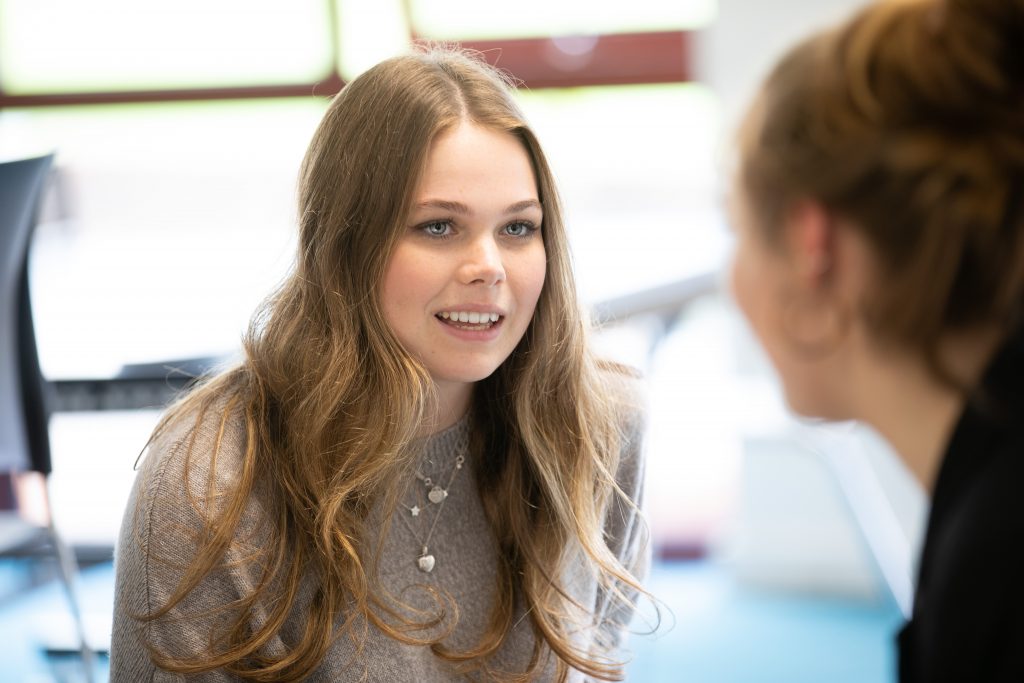
A Level Business
Overview
The A Level in Business Studies is a great qualification for students interested in studying Business nationally and internationally. Taught by specialist teachers using a wide range of teaching methods and interactive resources including trips, competitions and speakers. Housed in the historic core of Queen’s College, the department, known as ‘The Covers,’ comprises purpose-designed classrooms fully equipped with the latest technology.
Why Study?
Understanding business is fundamental to most careers these days and many of our students who undertake the A Level course go on to business courses at Higher Education or an apprenticeship. Although you will consider a variety of business questions supported by theory, the emphasis is on your ability to analyse business problems and evaluate your own solutions to these problems. You are required to take an interest in current business affairs through the watching of relevant television programmes, reading quality newspapers and magazines and using the internet. All students will have the opportunity to compete in our interschool economics and business competition, the QuBEC cup, at the end of Year 12.
Course information
Exam Board: Pearson Edexcel
In Year 12, you study Themes 1 and 2 and, in Year 13, Themes
3 and 4.
Theme 1: Marketing and People – Students will develop an understanding of:
• Meeting customer needs
• The market
• Marketing mix and strategy
• Managing people
• Entrepreneurs and leaders
Theme 2: Managing Business Activities -Students will develop
an understanding of:
• Raising finance
• Financial planning
• Managing finance
• Resource management
• External influences
Theme 3 Business Decisions and Strategies – This theme
develops the concepts introduced in Theme 2. Students will
develop an understanding of:
• Business objectives and strategy
• Business growth
• Decision-making techniques
• Influences on business decisions
• Assessing competitiveness
• Managing change
Theme 4- Global Business this theme develops the concepts
introduced in Theme 1. Students will develop an understanding
of:
• Globalisation
• Global markets and business
• Expansion
• Global marketing
• Global industries and companies
• (Multinational corporations)
Progression
Careers for Business Studies graduates are far reaching and include progression into jobs in marketing, operational logistics, buying, accountancy, human resources, and management as well as banking. 67% of business graduates find a job within six months of leaving university – ahead of other general subjects.
A Level Chemistry

A Level Chemistry
Overview
Chemistry at Queen’s is a vibrant mix of ‘hands on’ experiments, state-of-the-art technology and experienced and enthusiastic teaching. All the dedicated staff in the department work hard to make Chemistry exciting and rewarding by using a great variety of stimulating activities in teaching and learning.
Why Study?
As a Chemistry student, you will undertake significant experimental work. Test tubes and Bunsen burners, colours, smells, bangs and bubbles are part of Chemistry as much now as ever. These activities are enhanced by regular use of specialist computer software, both in the lab and in the computer room, data-logging equipment, LCD projectors, an interactive whiteboard, and molecular models. The teaching style promotes independent learning and the development of study skills which provides an excellent platform from which to go on to University.
Course Overview
You will follow the AQA Chemistry course and do a lot of experimental work that gets you thinking. The emphasis is on being able to handle concepts and problem solving rather than remembering lots of facts. Although you will not need to be A Level Mathematicians to cope, you will need to be able to think logically and carefully. Some Chemists are surprised by the amount of calculations you have to do which typically relate to practical contexts and involve rearranging equations, using ratios and keeping track of units and significant figures.
Progression
Each year several of the A grade Chemists gain places at Oxbridge and many read Medicine or Veterinary Science there and elsewhere. Degree courses chosen can be as diverse as Law, Languages and Archaeology as well as those that expect A grade Chemistry such as Medicine, Chemical Engineering or Biochemistry; a comprehensive careers support programme is in place for students wishing to move into medical fields.
A Level Computer Science
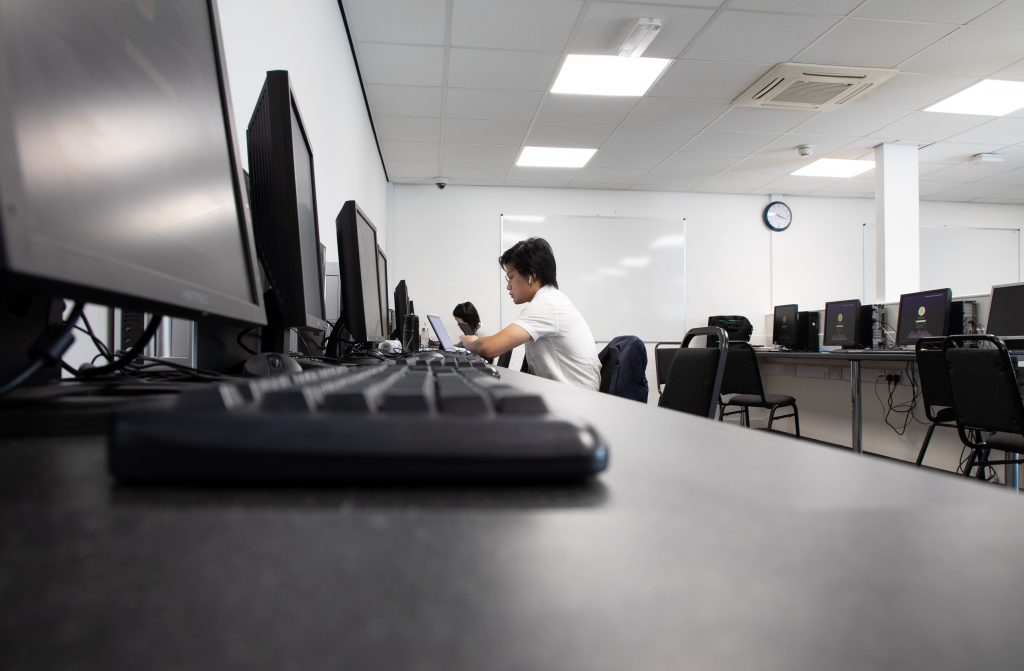
A Level Computer Science
Overview
ICT – both desktop and mobile – is becoming totally integrated within education at Queen’s College and is embedded across all subjects in the curriculum. Every department has integrated computer modules and apps into their schemes of work and the School’s wireless network is extensive. There are 330 connected computers on site giving instant access to the Internet, e-mail and other resources. The majority of the computers are Intel based PCs and laptops however pupils are increasingly using mobile devices and tablets such as iPads and Netbooks and even mobile phone technology, both in and out of the classroom.
Why Study?
Computer Science is a practical subject where students can apply the academic principles learned in the classroom to real-world systems. It is an intensely creative subject that combines invention and excitement and can look at the natural world through a digital prism. While having already studied Computer Science would be beneficial, students following this specification do not need to have any prior knowledge of Computer Science. However, the mathematical content of this course makes a high pass grade in GCSE Mathematics a prerequisite. The course is not just about training in a particular programming language but instead covers a wide range of computing topics. These include both the areas of computational thinking as well those covering how computer technology impacts our world. Computational thinking is a kind of reasoning used by both humans and machines which allows the creation of a computational solution for a given problem. This begins with the abstraction and decomposition of the problem and leads through to ultimately providing a coded
solution. Computer Science involves questions that have the potential to change how we view the world, from robotics to AI. Considered a strong course by Universities, the course is no less challenging than the other sciences, while providing many interesting and fun areas of study for interested students.
Course Overview
In A level Computer Science, the student will follow the OCR curriculum. This entails study in the following components:
1. Computer Systems (40% of total / written paper)
• The characteristics of processors
• Software and software development
• Exchanging data
• Data types, structures and algorithms
• Legal, moral, cultural and ethical issues
• Boolean Algebra and Floating Point Arithmetic
2. Algorithms and Programming (40% of total / written
paper)
• Elements of computational thinking
• Problem solving and programming
• Algorithms to solve problems
• Standard and advanced algorithms
A Level Design Technology
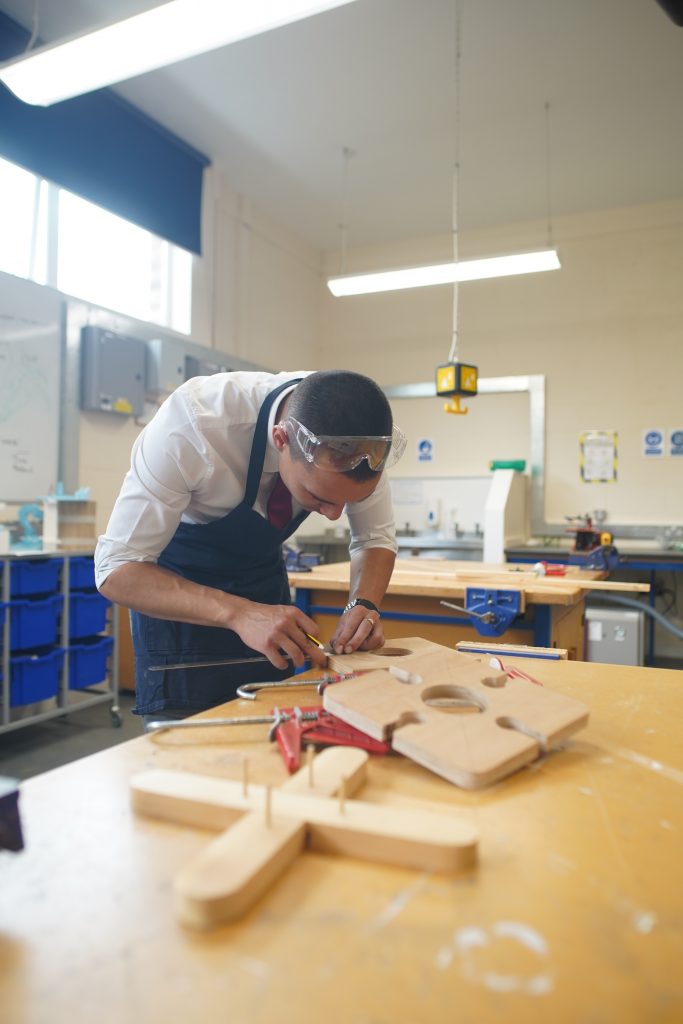
A Level Design Technology
Overview
The course intends to reflect the demands of a truly modern and evolving society and enable students to apply themselves and give them the skills to succeed in their chosen pathway, equipping students with design and problem solving skills for the future. Students will be able to recognise user needs and design solutions for these. Students also develop an understanding of how current global issues, including sustainability, emerging technologies, materials and production processes can impact on today’s world. The course encourages creativity and innovation. At A level students will develop the confidence to innovate and produce a variety of justified and sophisticated creative solutions for contextual problems as they work through a realistic development of their own prototype product for a real life client/end user.
Why Study?
Studying Design & Technology would be highly appropriate for those considering careers in Engineering, Product Design and the wider creative industries. The course directly builds upon knowledge and skills gained through GCSE Design and Technology.
Course Overview
The course consists of two interrelated parts: A written examination which focuses on the study of the Principles of Design and Technology
• Including, but not limited to: Materials, Processes and techniques, Material characteristics, Digital technologies, Design for maintenance and the cleaner environment, effects of technological developments,
Legislation.
An independently completed Design and Make project in which students will:
• Individually and/or in consultation with a client identify a problem and design context.
• Develop a range of potential solutions, including the use of computer aided design and evidence of modelling.
• Make decisions about the designing and development of the prototype in conjunction with the opinions of the user group or client.
• Realise one potential solution using practical making and project management skills.
• Design and make a prototype with regard to sustainability and the impact their design may have on the environment.
• Analyse and evaluate design decisions and outcomes for prototypes/products made by themselves and others.
• Gain an understanding of wider subject issues, including social, moral, ethical and environmental impacts.
The Examining Body for the Design and Technology (Product Design) Qualification is edexcel.
Progression
Design and Technology is an excellent route to university level engineering qualifications. You could study an HND, degree or advanced engineering or design and technology related apprenticeship, or find employment. Alternatively, it can also lead to a degree and career in Product Design, however the skills learnt in the subject are relevant to many aspects of modern business.
Level 3 Performing Arts BTEC

Level 3 Performing Arts BTEC
Exam Board: Pearson
BTECs are vocationally related qualifications, where learners develop knowledge and understanding by applying their learning and skills in a work-related context. Additionally, they are popular and effective because they engage learners to take responsibility for their own learning and to develop skills that are essential for the modern-day workplace.
Overview of the BTEC Extended Certificate
Where the BTEC in Performing Arts differs from A Level is that it has practical led elements which drive the course. Students should expect to be involved in rehearsal and performance activities at a consistently high standard, which requires a great deal of focus, discipline and professionalism. Students will be taught by subject specialist teachers of acting, singing and dancing, so standards will be high.
The BTEC will provide students with the opportunity to learn, enhance, and combine three key Performing Arts skills to a professional standard, of acting, singing and dancing. Through its approach students will gain a unique understanding of the focus and discipline needed in order to perform.
Although music, dance and drama form part of the assessment, the course offers flexibility to allow specialism in the individual’s favoured discipline.
What will you study?
The BTEC Level 3 National Extended Certificate in Performing Arts consists of four units. Three are mandatory, with two of those being externally assessed.
Mandatory content makes up 83% of your BTEC.
Mandatory units:
- Unit 1: Investigating practitioners’ work, externally assessed.
- Unit 2: Developing skills and techniques for Live Performance, internally assessed.
- Unit 3: Group Performance Workshop, externally assessed.
Example Specialist Units:
- Unit 27: Musical Theatre Techniques, optional, internally assessed.
- Unit 28: Variety Performance, optional, internally assessed.
Possible Career Paths
- Higher Education
- Performing Arts/Dance/Drama school
- Member of a Theatre/Performing Arts company
- Actor/Dancer/Director in film, television or media
- Teacher or workshop facilitator
- Manager/leadership
- Communication based job requiring well rounded and confident employees
Facilities
The Queen’s College resources and theatre spaces are unequalled and include:
- Drama studio fully equipped with technical facilities
- Queen’s Hall Theatre with an open-plan stage fully equipped with technical facilities. The venue is the focal point of College concerts and presentations
- Performing Arts studio with mirrors and a sound system
- Performing Arts Classroom with tech suite
- Sound Studio and numerous practice rooms
EAL (KS5)
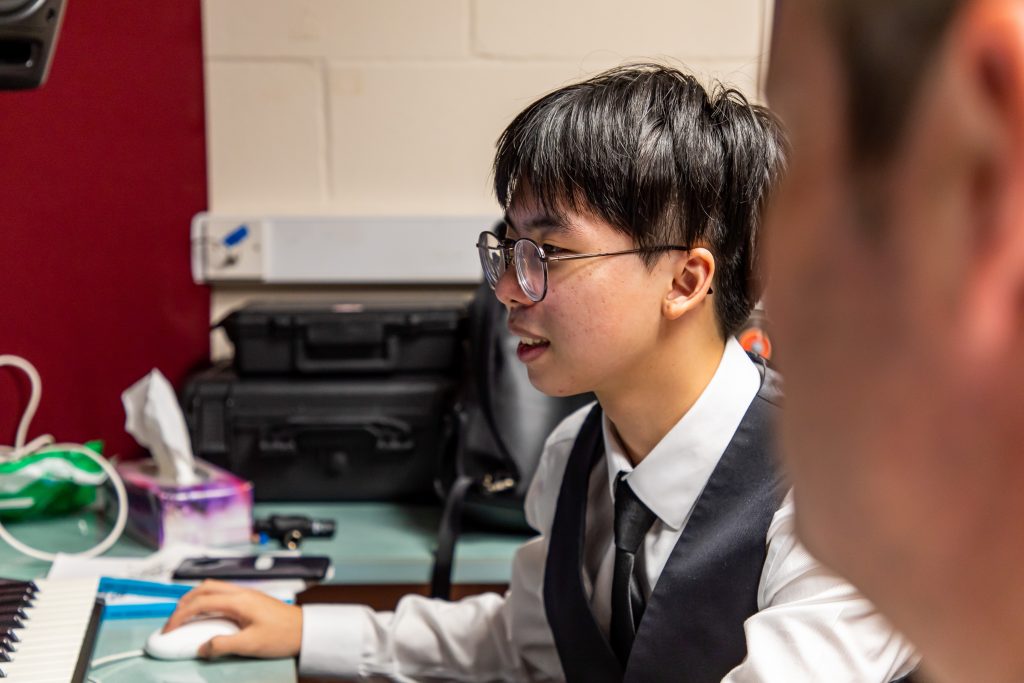
EAL (KS5)
International English Language Testing System (IELTS)
On entry into Year 12, pupils’ level of English will be assessed on arrival to plan the appropriate level of support suitable to their needs. Most EAL students attend a course to prepare them for the IELTS exam which is world-recognised and a requirement for study at UK universities as well as English-speaking universities overseas such as in The USA, Canada or Australia.
We are pleased to be able to offer this examination on the school site once per term; with students having the option to register for an exam at a time when they feel fully prepared, and without the need to travel to another test centre.
Course information:
The IELTS (International English Language Testing System) exam has four parts – listening, reading, writing and speaking and assesses students’ ability to use English in real-life and academic situations.
There are four parts to the listening section where students will hear a variety of recorded texts, including monologues and dialogues.
The reading section tests a range of reading skills with passages from newspapers, academic journals, magazines and textbooks.
Writing consists of two tasks. In task 1 students must describe data presented in a graph or diagram. Task 2 requires students to discuss a current issue; presenting and justifying an opinion or assessing and analysing a development or problem.
An interview between student and examiner forms the basis of the speaking assessment. Students are then given a topic and prepare a two-minute talk from which follow-up questions are asked.
Assessment:
There is no pass or fail in IELTS; candidates are instead graded using scores from 1-9 for each component of the exam (each component is weighted at 25%) and are then given an overall average score. A student’s score is valid for two years.
Access to university:
IELTS requirements for university access vary depending on institution and course, but at Queen’s College we always aim for our students to leave with at least a 6.5 in IELTS in order to provide them with as many opportunities and options for Higher Education or employment as possible.
Why study IELTS at Queen’s College?
- On-site official IELTS examinations running 3 times a year
- Small groups of learners (15 students maximum)
- 7 hours of IELTS instruction per fortnight
- Specialised IELTS speaking lessons in groups of no more than 4, once per week
- Use of the most up-to-date textbooks and test preparation materials
- Personalised use of the Road to IELTS software with each student receiving their own account
- Highly trained and experienced teachers including previous IELTS examiners
- EAL teachers who work closely with the Sixth Form team in order to ensure that students gain access to their chosen university courses through UCAS or overseas applications
Useful Links:
www.takeielts.britishcouncil.org
Team Bio:
Head of EAL: Miss Helen Goodall has over 15 years of experience teaching EAL and has worked in the UK and overseas including China and Indonesia. She completed her degree and PGCE at Cardiff University and has worked at Queen’s College since 2013.
EAL Teachers: Mrs Karen Williams & Mr Sam Tarr
Mr Tarr has had extensive experience in education for over 15 years, working in Italy and China. He graduated with an MA in Applied Linguistics from the University of Portsmouth in 2011 and joined the staff at Queen’s College in February 2020 where he also undertakes boarding house duties in School House. An Old Queenian, Mr Tarr was a pupil here from 1989 to 1995.
EAL Teacher: Mrs Karen Williams
Mrs Williams has ten years of experience teaching EAL to students of all ages and abilities. She joined Queen’s College in 2014. Prior to this she spent two years in the north of Spain, teaching English to teenagers and adults. She completed her degree in History and Religious Studies at Lancaster University. Before life as an EAL Teacher she lived and worked in London for a number of years where she tried her hand at freelance travel / lifestyle writing, alongside various roles in the charity sector. In her spare time she enjoys travelling, baking, swimming, reading and, more recently, being a mum.
Miss Goodall has over 15 years of experience teaching EAL and has worked in the UK and overseas including China and Indonesia. She completed her degree and PGCE at Cardiff University and has worked at Queen’s College since 2013.
A Level Economics
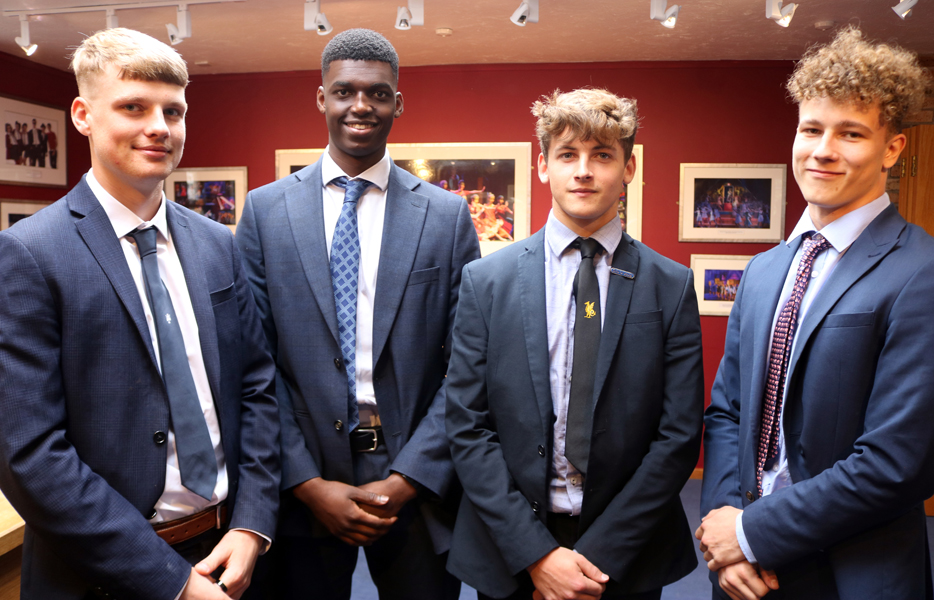
A Level Economics
Overview
Economics is about choice and the impact of our choices on each other. It relates to every aspect of our lives, from the decisions we make as individuals or families to the structures created by governments and firms. An economic way of thinking can help you make better choices.
Why Study?
Economics A-Level is the right subject for you if you enjoy: debating economic issues such as inequality, immigration and how we should pay for healthcare using and interpreting data to analyse economic problems, discussing alternative courses of action and keeping up to date with national and international trends. Many students that study this course go on to higher education or choose to pursue an apprenticeship. All students will have the opportunity to compete in our interschool economics and business competition, the QuBEC cup, at the end of Year 12.
Course Overview
Exam Board: Pearson Edexcel – Economics A specification.
The subject has been grouped into four broad areas of study. In Year 12 we study Theme 1 and 2. Theme 1 is microeconomics where students will be introduced to the nature of economics, how markets work and why they fail. Theme 2 we study macroeconomics where students will explore how businesses grow and compete. In Year 13 we study Theme 3 and Theme 4, these are an extension of Year 12. Theme 3 is micro where the Year 12 content will be supplemented with studying the role of government and the UK economy. Theme 4 is macro where the Year 12 content will be supplemented with studying the labour market and how the government intervenes to make markets work better. Students’ will also explore international trade, inequality within and between countries, emerging and developing economies, and the public finances. Additionally they will also have an opportunity to consider the role and impact of the financial sector.
Progression
Economics can lead to a wide range of careers in Economics and Finance-related professions including: Accountant, Actuarial Analyst, Chartered Accountant, Data Analyst, Economist, Finance and Banking, Financial Risk Analyst, Financial Planner, Forensic Accountant, Investment Analyst, Statistician, Stockbroker
A Level English Literature
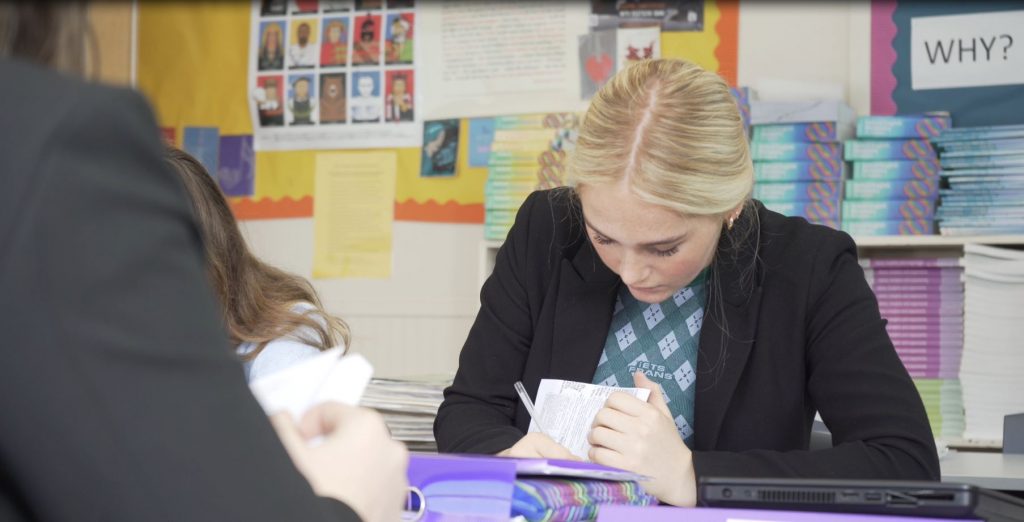
A Level English Literature
Overview
English Literature A-Level is taught by a pair of highly experienced, enthusiastic individuals who share a common love of written and spoken English. We draw on a range of specialist interests and knowledge including drama, Shakespeare, contemporary and Victorian prose, Dystopian fiction and Gothic fiction within the department, to name but a few.
Why Study?
There are many skills that you will learn whilst studying English Literature at A Level including accurate written English, articulate oral presentation, critical thinking skills and a thorough understanding of our socio-political context. By the end of the course, as a student of English Literature you will be a well-informed, critical thinker and writer who has a more mature appreciation of humanity and culture. Lively and challenging teaching methods and imaginative task-setting means that you will be fully engaged and inspired with lots of opportunities to go beyond the curriculum. Many English Literature students choose to continue the subject at university. English is taught in a suite of classrooms with a dedicated Sixth Form English Literature library attached. It contains an extensive range of prose, poetry and drama including classic fiction and contemporary award-winning texts, plus critical texts to widen your understanding of reception to literary texts; wider reading and a love of fiction is encouraged. Many theatre trips are run, including Ian McKellen’s ‘Hamlet’ in Windsor, and many trips to the Globe and the Bristol Old Vic. You will have the opportunity to enter into national essay writing and poetry competitions and participate in our very strong debating society, for which Queen’s has an outstanding reputation.
Course Overview
At Queen’s we have chosen to teach the OCR A Level, believing that it is structured to best support students through final exams, whilst also offering the broadest range of choices of Literature. All A Level syllabi include Shakespeare (the greatest writer of them all) and we opt for ‘Hamlet’; it builds beautifully on the exploration of the human psyche seen in ‘Macbeth’. A study of texts on a given context is a key part of the course, and we have opted for the Gothic tradition. Coursework covers a poet, a play and a novel and all are modern texts, post-1900, chosen according to the teacher’s own interests and passions. As with GCSE, we believe that flair in teaching comes from a love of the Literature itself, and we are best equipped to bring that Literature to life when teaching what we most enjoy.
Progression
Many of our students progress onto university either to study this subject further or to study one of the aforementioned subjects. It is a diverse qualification that will help you achieve an analytic and evaluative mindset, which is essential in fields such as journalism, publishing, data analysis, research and the media.
Leiths CTH Level 3 Extended Certificate in Professional Cookery

Leiths CTH Level 3 Extended Certificate in Professional Cookery
The Level 3 Extended Certificate in Professional Cookery accredited by the Confederation of Tourism and Hospitality (CTH) is a hands-on practical cookery qualification. It is a five-term course based around practical menus designed to develop a wide range of culinary and transferable skills.
The course is designed for students who want to develop the knowledge and skills required for a wide range of careers as well as a lifetime love of cooking good food. This qualification enhances a personal statement and UCAS application and can play a pivotal role in opening the door to careers in food and drink including becoming a chef, food photography and product development as well as marketing and advertising in food. The course also offers a clear onward learning pathway to the Level 4 Diploma at Leiths School of Food and Wine in London.
Graduates of this Level 3 extended certificate in professional cookery can contact Leiths employment agency, Leiths List, who will help secure opportunities for short or longer-term employment. The final grade of Pass (55-69%), Merit (70-84%) or Distinction (85%) is awarded at the end of the course after two 3-hour practical cooking assessments, an online food hygiene and allergen exam and a menu planning coursework task. Students also enjoy working together to plan and host a community cooking event.
NB: This course carries an additional charge per candidate of approximately £600 for the full five term course.
Whilst this is an accredited Level 3 course, the Leiths Extended Certificate does not attract as many UCAS points as a full A Level. As a result, students who wish to ‘top-up’ the course will be offered the opportunity to complete a related Extended Project Qualification (EPQ).
A Levels Languages
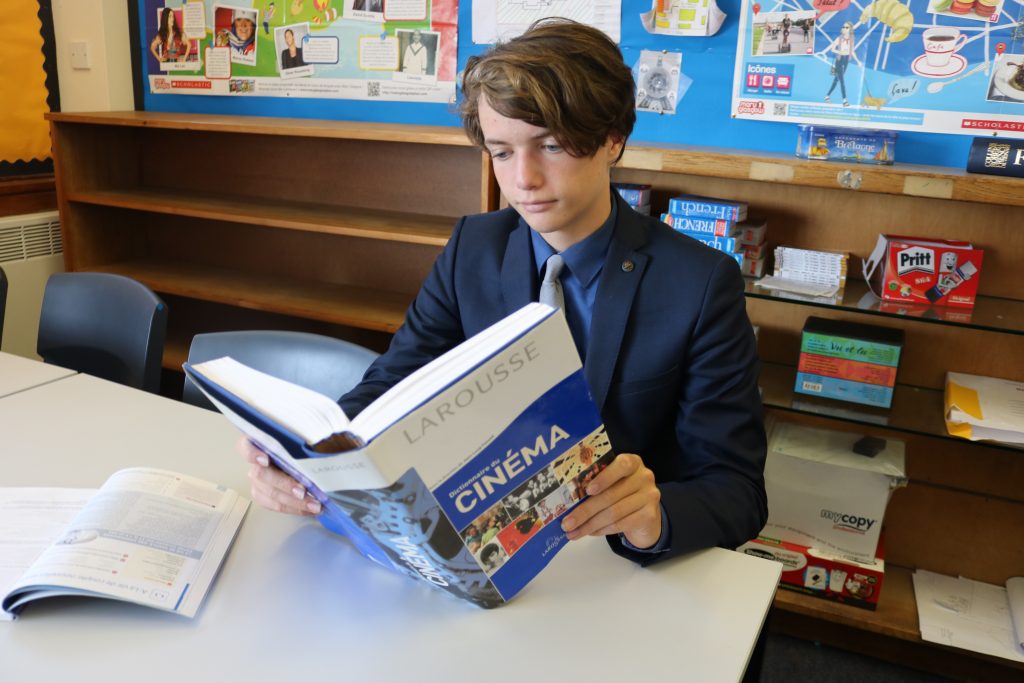
A Levels Languages
FRENCH A Level
The Modern Languages department aims to develop as fully as possible students’ innate linguistic ability and the teaching is sympathetic, supportive and, as far as possible, tailored to individual needs. A range of techniques and activities are employed to make the learning process as enjoyable and stimulating as possible.
The atmosphere in Sixth Form lessons is relatively relaxed in order to produce a good exchange of ideas between students and teacher. Nevertheless, hard work is needed to achieve a high grade at A and AS level.
Course information:
The A Level specification requires Year 12 students to study topics such as: the changing role of the family, cyber-society, charity work, French heritage, French music and French cinema. They also study a piece of French literature, such as Albert Camus’ “L’Etranger”.
In their Year 13, students go on to study such topics as: the positive features of a diverse society, the treatment of criminals and the marginalised, politics (elections, entitlement, protest) and issues relating to immigration. Students also make an in-depth study of a French film, such as Louis Malle’s “Au Revoir Les Enfants”, and undertake an Individual Research Project about a topic of their choosing.
Assessment:
Students are assessed across all four skills: Listening, Speaking, Reading and Writing. The Speaking element of the exam is taken in advance of the main examining period. Students will be expected to write in French and English when answering key questions across the other papers. Key skills such as translation to and from French, summarising key information from a listening extract and text, inferring information as well as completing grammatical gap-fill exercises will be examined for the listening and reading exams. Students will be expected to write two essays; one based on the film studied and another based on the literary text studied.
Why study French?
There is no doubt that students who visit the countries whose languages they are studying come back motivated and enthusiastic to improve their language skills further. With that in mind, we help students organise work placements in France so that they are able to appreciate the culture, people and language first hand.
Studying a language at A-level gives you the opportunity to practise key skills which can be useful for all careers choices. The ability to understand and communicate in another language is a life-long skill for education, employment and leisure purposes. Through the study of a language, you can discover new cultures and broaden your view of our globalised world. In current climates, employers look favourably on future employees with the ability to speak another language.
Studying a language at university can involve studying languages solely or more often they can be combined to get joint or multiple Honours degrees. There is a wide range of courses available in universities where you can study a language ab initio in conjunction with another language studied to A-level standard.
In recent years several students have continued French at university or have started a new language, on its own or in conjunction with subjects such as cinema, music, history, economics, education, management, European Studies, international relations, international politics, journalism or linguistics.
Progression:
Through the Erasmus Scheme or equivalent, universities are also able to offer undergraduates the opportunity to do part of their degree course abroad – a popular choice for students as it gives them an ability not only to become fluent but also to enjoy the culture of that particular country.
Some key areas of employment after university are: civil service, education, media and journalism, marketing and publishing, transport and logistics and IT and telecommunications.
Useful Links:
https://www.ucas.com/explore/subjects/languages
SPANISH A Level
The Modern Languages department has enthusiastically embraced the revolution that has taken place in Language learning in recent years.
The department aims to develop as fully as possible students’ innate linguistic ability and the teaching is sympathetic, supportive and, as far as possible, tailored to individual needs. A range of techniques and activities are employed to make the learning process as enjoyable and stimulating as possible.
We study the AQA specifications in Spanish. The atmosphere in Sixth Form lessons is relatively relaxed in order to produce a good exchange of ideas between students and teacher. Nevertheless, hard work is needed to achieve a high grade at A and AS level.
The new A-Level syllabus covers a range of topics in its first year such as: media including television, advertising and communication technology; popular culture – cinema, music, fashion and trends; as well as topics such as family and relationships which includes friendships, marriage and partnerships. Students also study a Spanish film, such as “Volver” by Pedro Almodóvar.
The subject content in Year 13 comprises of the following themes: the multicultural society including immigration, integration and racism; and contemporary social issues such as modern day idols, Spanish regional identity including traditions and customs as well as cultural heritage. Additionally, students also make an in-depth study of a Spanish film, such as Laura Esquivel’s “Como agua para chocolate” and undertake an Individual Research Project about a topic related to a Spanish speaking country or community.
Assessment:
Students are assessed across all four skills: Listening, Speaking, Reading and Writing. The Speaking element of the exam is taken in advance of the main examining period. Students will be expected to write in French and English when answering key questions across the other papers. Key skills such as translation to and from French, summarising key information from a listening extract and text, inferring information as well as completing grammatical gap-fill exercises will be examined for the listening and reading exams. Students will be expected to write two essays; one based on the film studied and another based on the literary text studied.
Careers Progression:
In recent years several students have continued Spanish at university or have started a new language, on its own or in conjunction with subjects such as cinema, music, history, economics, education, management, European Studies, international relations, international politics, journalism or linguistics.
Through the Erasmus Scheme, universities are also able to offer undergraduates the opportunity to do part of their degree course abroad – a popular choice for students as it gives them an ability not only to become fluent but also to enjoy the culture of that particular country.
Useful Links
A Level Geography
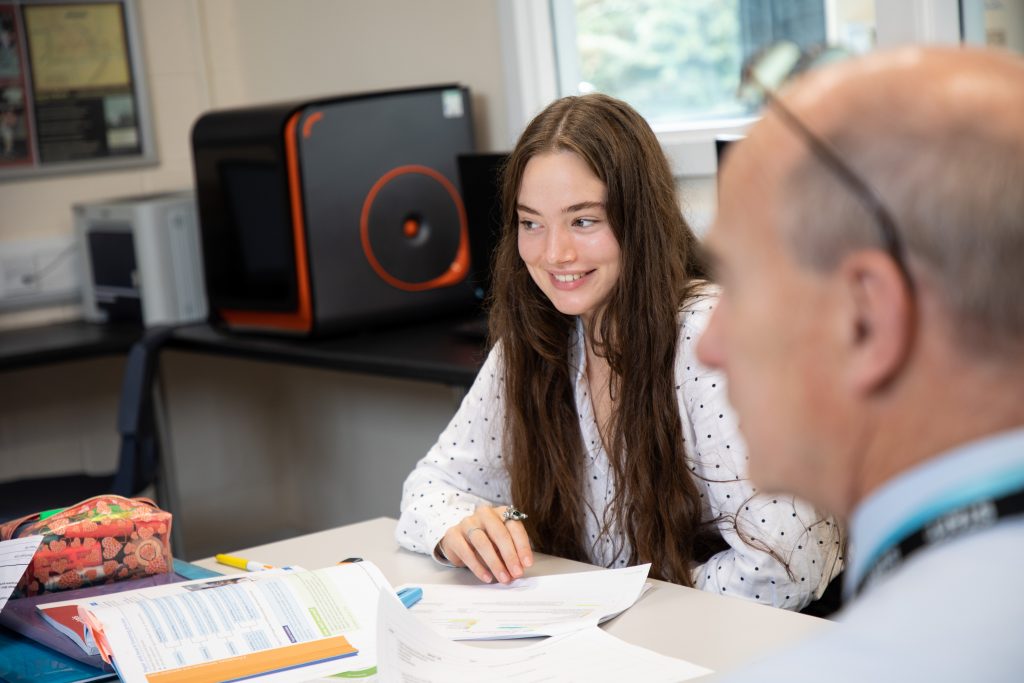
A Level Geography
Overview
The aim of the Geography Department is to prepare you to take an active and intelligent interest in the world in which you live. During these times of unprecedented change, geography provides a safe platform to explore global and local issues from climate change and sustainability to the development gap and globalisation. The Geography Department is a highly successful department and is staffed by experienced and enthusiastic subject specialists.
Why Study?
Geography equips students with the ability to analyse and interpret information and make decisions based
on a holistic understanding of concepts, models and theories as well as observations of the world around us. It is particularly pertinent today as we face the many challenges of climate change, development, globalisation and sustainability. Knowledge and understanding of these topics is crucial for the decision-makers of the future.
Course Overview
At A Level, as a Geographer you will follow the OCR specification, which enables you to develop and extend your study of thematic and place-orientated aspects of the subject. In Year 12, you will study Coasts and Earth’s Life Support Systems in Physical Geography. This includes understanding the carbon and water cycles and our impact upon them. This is vital information in order to equip pupils with the ability to make informed decisions in relation to climate change. In Human Geography we consider the concepts of ‘Space’ and ‘Place’ and look at the varying factors that determine how we interact with urban and rural areas. We will also study human rights and the challenges as well as opportunities of migration. Year 13 focuses on the more holistic study of food supply in Human Geography and Hazards in Physical Geography. These topics are assessed through Paper 3 which aims to test pupils’ broader understanding of the subject and the synoptic links between all elements of Geography. Pupils in Year 13 will also undertake an individual investigation which will involve primary data collection and can be based on any part of the A Level specification.
Progression
Geography is one of the best subjects for employment and a fast-growing subject for a career choice. Students have gone on to study subjects such as Geology, Oceanography, Environment and Development, Environmental Science, Geoscience, journalism and
Urban Planning. There is also a significant increase in students following careers related to the challenges of combating climate change. These include sustainable energy, geo-engineering, conservation and sustainable low-carbon planning.
A Level History
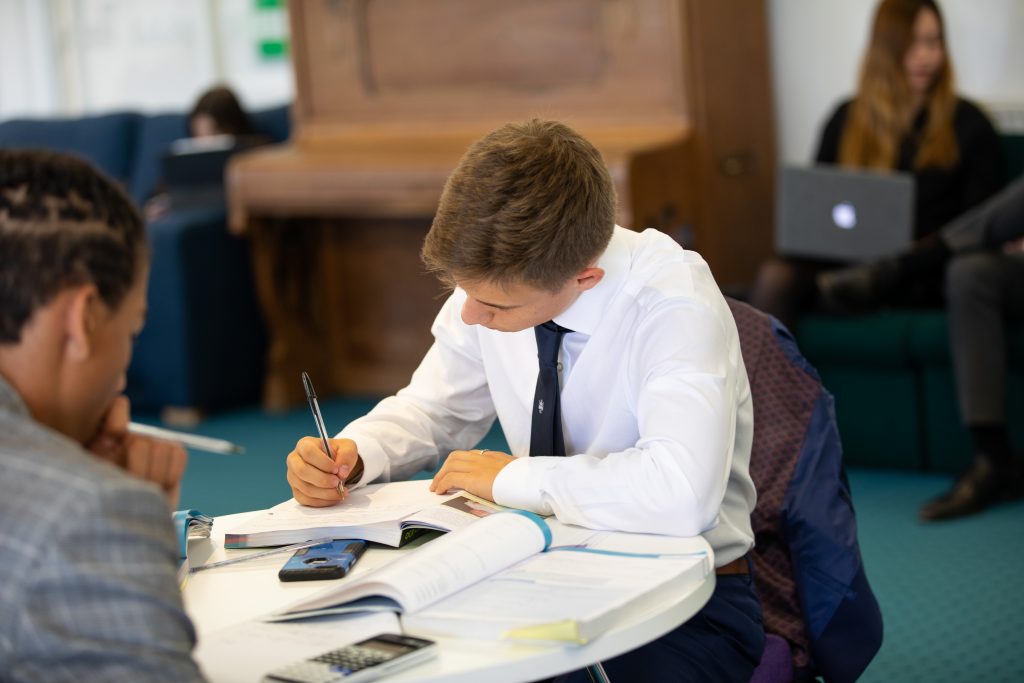
A Level History
Overview
History is a very exciting subject and a popular one. It generates an enthusiastic and enduring interest in the subject and promotes the key objectives of developing your ability to think for yourself and to arrive at logical and reasoned judgements which you will be able to articulate clearly. Many staff in the department are examiners for OCR and have a lot of experience. In preparation for your examinations, you will study specific periods and topics with the emphasis on increasingly independent work and thorough engagement in class will be encouraged.
Why Study?
Visits and extra-curricular activities are an integral part of each syllabus taught and outings are arranged whenever possible. History outings to local sites and the theatre are organised where appropriate as well as to Sixth Form Conferences. The department also arranges regular lectures for the Historical Association for the students and members of the local community who are interested in historical issues and events.
Course Overview
The OCR course is followed which gives a breadth and depth of study. Pupils will study both the 15th- 20th Centuries. Students will study both Britain 1930-1997 along with the European study of Spain from 1469 – 1556. Pupils will also examine the rise of German nationalism, and subsequent unification in the 19th century. A private study essay is also completed as coursework which allows the students a chance to study something of personal interest.
Progression
It is usual for there to be at least one Oxbridge candidate who studies History every year and a large proportion of pupils exceed the standard expected of them in public exams. The Historical Association has written a pamphlet on History as a preparation for a Career which can be downloaded by clicking on this link and students go on to study degree courses including history, management, media studies, international affairs, law and social sciences.
BTEC Marketing
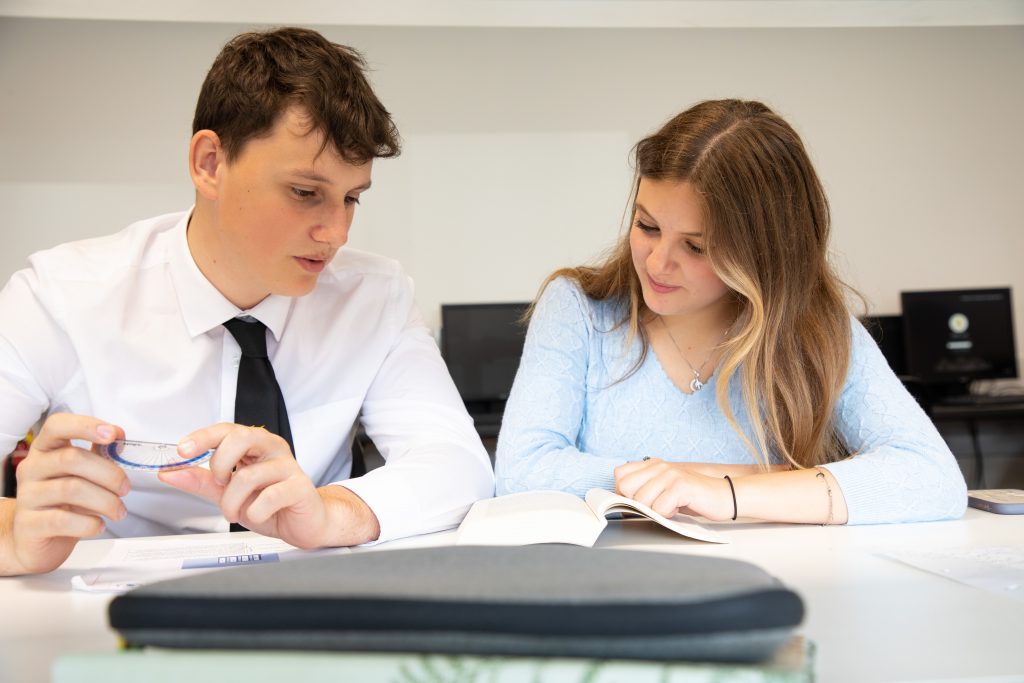
BTEC Marketing
Overview
Marketing BTEC Level 3 National Extended Certificate is an exciting qualification and is a great entry point for students considering a career in Marketing. The BTEC Extended Certificate has two internally assessed units and one externally examined unit.
Why study?
The qualification is aimed at learners who are looking to progress to employment in the sector via an apprenticeship and whose aspirations may also be to enter higher education. The qualification is fully mapped to the CIM L3 Foundation Certificate in Professional Marketing. This means that it will be recognised by employers and will support entry into this industry as a marketing executive. When combined with other Level 3 qualifications, this qualification also offers learners the opportunity to progress to a broad range of higher education programmes, including Higher National Diploma and bachelor degrees.
Course Overview
• Unit 1: Careers in Marketing – this is an investigation into careers in marketing and learning suitable skills for recruiting marketing staff
• Unit 2: Marketing Principles (externally assessed) – in this unit you will learn key marketing principles and take an external exam
• Unit 3: Customer Communications – this is an investigation into customer communication and you will create a communications plan. This unit is internally assessed.
Progression
The content of this qualification has been developed in consultation with employers and professional bodies. This ensures that the content is appropriate and consistent with current industry practice to enable learners to enter employment directly. Higher education institutions have been consulted to ensure it allows appropriate progression for those aspiring to go to higher level study.
A Levels Mathematics & Further Mathematics

A Levels Mathematics & Further Mathematics
Overview
The Mathematics staff at Queen’s College are highly experienced and utilise both traditional and modern approaches in their teaching. Students are encouraged to problem solve both individually and in groups, developing knowledge previously learnt at GCSE, as well as introducing many completely new and interesting concepts. You have the option to choose whether you would like to study
Mathematics A Level, or the combined Mathematics and Further Mathematics A Level courses. If you choose the latter option this will take up two of your option blocks, but typically we cover the content of A Level Mathematics in Year 12, and the A Level Further Mathematics content in Year 13.
Why Study
All areas of the Mathematics and Further Mathematics A Levels can be used in a broad range of future areas. The study of Pure Mathematics allows greater understanding of the world around us, providing the language needed for many careers as well as allowing you to develop skills to model and understand every day, real world situations. The Mechanical aspects of the course allow you to appreciate fully the forces and concepts around us, whilst the Statistical aspects of the course can help you to model predictions for the future in anything from information about a cohort to the number of checkouts required in a supermarket at peak service time. Mathematics really does set you up for so many different aspects of life, and having a background in Mathematics can help support any future choices for study or careers. Many university courses look favourably on an A Level in Mathematics, and some courses outside of Mathematics have it as a specific requirement.
Course Overview
We follow the Pearson Edexcel course for A Level, as it provides a rich and exciting array of different topics. This is extensive so I will not provide a full topic list here, however these would include algebraic methods, trigonometry, differentiation and integration for Pure Mathematics, mathematical modelling and statistical analysis for Statistics and moments, application of forces, projectiles and kinematics for Mechanics. Both A Levels are fully assessed by examination at the end of Year 13. Mathematics consists of three equally weighted exams. Further Mathematics has a requirement of two Pure exams and two applied exams which are all equally weighted, but we teach and take exams in Statistics, Mechanics and Decision Mathematics where the best two overall scores are used towards your final grade.
Progression
Some of the most interesting and well-paid careers revolve around Mathematics. Careers in Finance, Medicine, Engineering, and Business are all open to people with a background in Mathematics, as are careers in technology — Mathematics being at the very core of all new technological developments. It is also worth considering careers where Mathematics is not so obviously used, for example consider conservation where the modelling of species growth and decay is vital, or the necessity to calculate accurately the wind speed and direction as an Airline Pilot, the opportunities are endless.
BTEC Outdoor Education

BTEC Outdoor Education
Overview
The Pearson BTEC Level 3 Foundation Diploma in Sport and Outdoor Activities is a suitable course for post- 16 learners looking to progress into higher education when run alongside A-levels or other BTECs. It is also a suitable course if you’re planning to go directly into
employment as an Outdoor Activities Instructor or similar role in the wider leisure industry.
Why Study?
Due to the nature of BTECs, students will partake in ongoing assessments throughout the duration of the two year course. This will involve a mixture of written and practical assessments but no formal exams. The content of this qualification has been developed in consultation with higher education institutions, employers and professional bodies, most notably the Institute for Outdoor Learning (IOL), in order to confirm that the content is appropriate and consistent with current industry practice and to ensure that the qualification allows progression for those aspiring to higher-level study
Course Overview
• Unit A: Careers in the Sport and Active Leisure Industry
• Unit B: Health, Wellbeing and Sport
• Unit C4: Personal Skills Development in Outdoor Activities
• Unit 24: Health and Safety Factors in Outdoor Learning
• Unit 25: Outdoor Activity Provision
• Unit 27: Expedition Experience (This will include UK & overseas expeditions)
Progression
Learners with this qualification can go on to work as a freelance outdoor activities instructor. They can work at a variety of outdoor pursuit centres. They can work as expedition leaders in the UK and overseas. With this qualification, learners can also progress to degree programmes, such as a BA (Hons) in Outdoor Adventure Leadership, a BSc (Hons) in Outdoor Adventure and Environment and a BSc (Hons) in Outdoor Adventure Leadership and Management.
A Level Photography

A Level Photography
Overview
Creativity is becoming one of the most important skills in today’s society. The future is constantly changing to adapt to developing technology and a pupil’s ability to think creatively and innovatively is increasingly important. The Drama and Art Building at Queen’s College offers some of the best facilities in the South West. The spacious, superbly lit studios offer specialist teaching facilities for fine art, printmaking, photography, textiles and ceramics. There are well-equipped rooms for GCSE pupils whilst each A Level pupil has their own exhibition and working space. Head of Department, Rebecca Cade, Teachers of Art, Laura Burgoyne and Sandra Spall, and the Art Technician, Alison Luisi, have specialisms in textiles, painting, printing, ceramics and mixed media, and are all practising artists.
Why Study?
As a Photography pupil, you will be involved in personal enquiry and expression involving the selection and manipulation of images. You will employ creative approaches which go far beyond mere observation and recording. Digital Photography is taken to another level and experimenting with what you create is essential. The A Level course builds upon knowledge, understanding and the development of skills through research, experimentation and critical and contextual understanding. You will generate practical work, ideas and research from primary and contextual sources and then present your outcomes based on themes developed from personal starting points. In the second year of the course there are two-linked elements, each with separate final outcomes – practical work and personal study. The development of these is shown through supporting studies; your innovation and creativity will be essential as will be your own, strong, personal identity. The externally set assessment is again based on one broad-based thematic starting point and plenty of guidance is given to you through the preparatory period.
Course Overview
Our topic lists change every year; this enables us to keep our ideas fresh and to keep us up to date with what is going on in the world around us.
Course outline:
• 60% coursework including a written personal study.
• 40% Exam- The exam is a practical 15 hour timed test.
Career Progression
A university course in a creative subject will require the creation of a portfolio. Taking 1 or more of our A Level subjects will prepare them for this stage, and we will support them with this. Many of our pupils have progressed from A Level to study creative subjects at a variety of institutions, including Central Saint Martins, Kingston, Falmouth, Edinburgh and Glasgow. We are incredibly proud of all our pupils and their achievements to date, at Queen’s and beyond.
A Level Physical Education
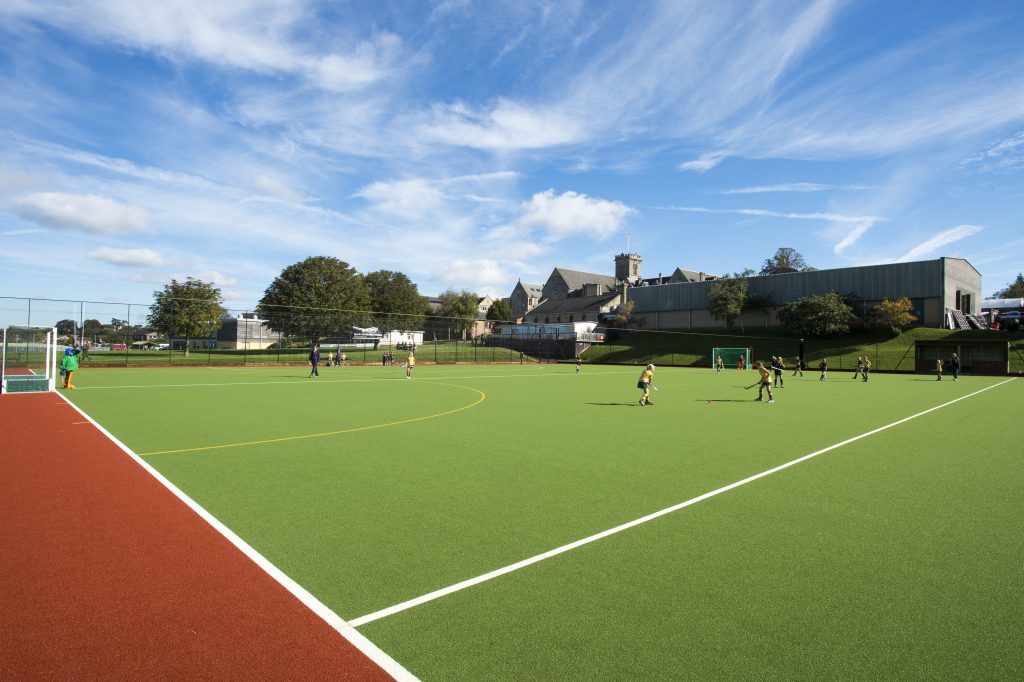
A Level Physical Education
Overview
A level Physical Education qualification allows students to play to their strengths and gain dynamic theoretical and practical skills for further education or work. A-level Physical Education qualification has been expertly tailored to allow a combination of content refreshment previously covered in GCSE Physical Education, whilst embedding new content from topics such as Technology in Sport, Biomechanical movement and Sports Physiology.
Why Study?
A level Physical Education is a two-year course comprising two exam papers (2 hours), practical performance and written coursework.
Course Overview
Paper 1: Factors affecting participation in physical activity and sport; is divided into three sections:
• Section A: Applied Anatomy and Physiology
• Section B: Skill acquisition
• Section C: Sport and Society Assessment
• Written exam: 2 hours
• 105 marks
• 35% of A level
Questions
• Section A: multiple choice, short answer and extended writing (35 marks)
• Section B: multiple choice, short answer and extended writing (35 marks)
• Section C: multiple choice, short answer and extended writing (35 marks)
Paper 2: Factors affecting optimal performance in physical activity and sport; is also divided into three sections:
• Section A: Exercise Physiology and Biomechanics
• Section B: Sport Psychology
• Section c: Sport and Society and technology in sport Assessment
• Written exam: 2 hours
• 105 marks
• 35% of A level
Questions
• Section A: multiple choice, short answer and extended writing (35 marks)
• Section B: multiple choice, short answer and extended writing (35 marks)
• Section C: multiple choice, short answer and extended writing (35 marks)
Non-exam assessment (NEA): Practical performance in physical activity and sport Assessment
• Students assessed as a performer or coach in the full sided version of one activity.
• Written/verbal analysis of performance.
How it’s assessed
• Internal assessment, external moderation
• 90 marks
• 30% of A-level
Progression
Most students who study A-Level PE go on to University in areas such as Sport Science, Sports Coaching, Sport Psychology, Sports therapy/Physiotherapy or other science based degrees
To view all Physical Education information
A Level Physics
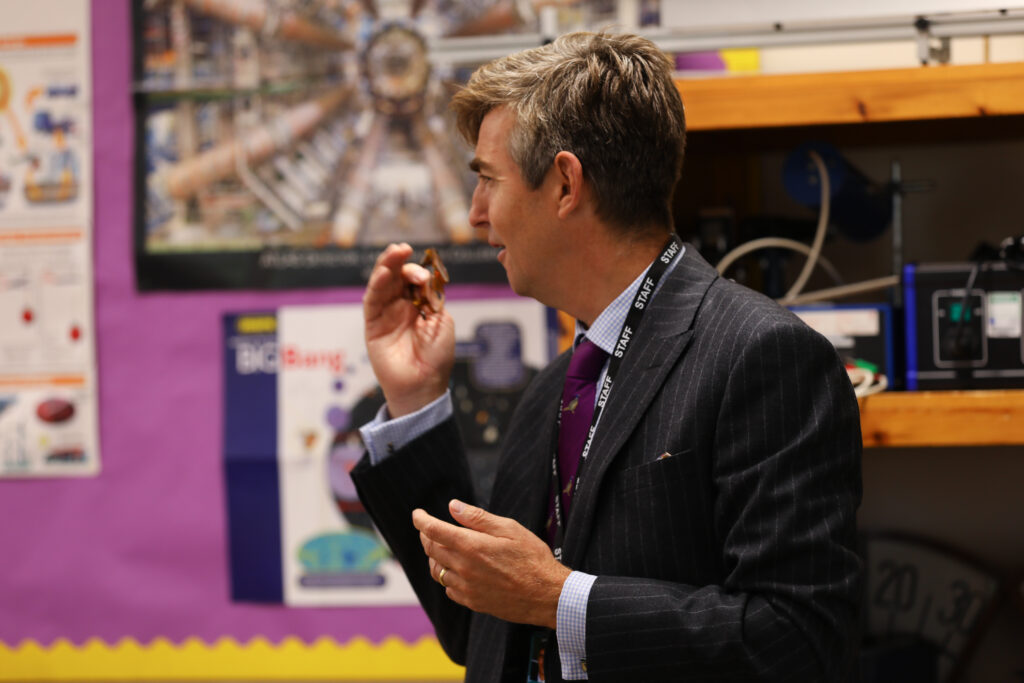
A Level Physics
Overview
The Physics department aims to make Physics an enjoyable subject for all those who study it, incorporating as much practical work at all levels and with as many unusual experiments as possible. Physics is housed in a purpose-built laboratory block with three labs and a preparation room. The department has a very good stock of modern apparatus including an electron diffraction tube, many oscilloscopes including a digital storage oscilloscope module, radioactivity apparatus and data logging equipment with accurate sensors.
Why Study?
Physics is the study of the Universe using the scientific method. This means that all of space, time, energy and matter fall within its scope; from the smallest fundamental particle through the world humans experience to the largest galaxies observed and beyond. There are a myriad of excellent reasons for studying Physics. For some it is on the direct pathway for a particular career. Others want an understanding of how the world works and how we can create new technologies. A Level Physics will give you incredibly strong analytical and research skills and help develop your critical thinking. You will be able to come at problems and solve them in a methodical and logical way. You will be able to investigate theories, devise tests and explore new ideas. Such strong problem-solving skills are highly sought after by employers.
Course Overview
We study the OCR “Physics A” A Level. The subject breakdown is:
Year 12:
• Newtonian Mechanics
• Material science
• Electric Circuits
• Waves
• Quantum Mechanics
Year 13:
• Thermal Physics and Ideal Gases
• Circular and Simple Harmonic motion
• Gravitational Fields
• Astronomy and Cosmology
• Electric and Magnetic Fields
• Particle and Nuclear Physics
• Medical Imaging
Progression
From cancer treatment to tackling climate change, gaming to robotics and artificial intelligence, physics and physicists are on the front line, helping to shape the future. At a time when jobs are changing, Physics offers a vast and expanding
range of career paths. And it’s not only science and technology. What many people don’t realise is how valued and respected physics skills and ways of thinking are in other, often well-paid, industries – like Finance and Law. Physics A Level has been named as a “facilitating subject” by the Russell Group of universities, which means it can be useful for getting onto a wide range of university courses. Physics A Level is usually required for degree courses in: Engineering (general, aeronautical, civil, electrical, mechanical, and sometimes chemical), and, you guessed it, Physics. It is often recommended or useful for: biochemistry, Biology, Chemistry, Medicine, Dentistry, Nursing and other practice based medicine courses, Architecture, Computer Science, Geography, Earth and Environmental Sciences, Maths, Materials Science, Pharmacy, Sports Science, Surveying, Psychology.
A Level Psychology

A Level Psychology
Overview
If you wish to study Psychology, it is not necessary to have studied the subject before, although an interest in human behaviour and science is advantageous. During the course, you will need to be able to communicate effectively and research information from a variety of sources and will be expected to keep up-to-date with current affairs and relate these to relevant areas of Psychology.
Why Study?
The study of Psychology at A Level will enable you to gain an understanding of psychological theories, research, case studies and methods used to collect data. You will explore topics which reflect current contemporary issues as well as earlier case studies, participate in and conduct psychological investigations, collect data, analyse your own or second hand data and evaluate your findings. There will also be the opportunity to develop an awareness of the ethical issues in Psychology – particularly in the field of research, and to relate theories to practise and explore self-discovery.
Course Overview
Invariably students in Year 12 are new to psychology therefore we offer a clearly structured introduction to the course which includes writing summaries of research, completing worksheets, practising exam questions and developing a comprehensive glossary to enable them to be psychologically literate. Transferable learning skills such as collaborative group work, peer assessment and academic reading are developed through a variety of classroom and homework based activities which promotes critical thinking skills necessary for detailed analysis and evaluation of research data. The latter half of Year 13 is based around comparison of the effectiveness of the different perspectives adopted by psychologists in studying human behaviour, including their implications on philosophical debates such as our free will to make choices. The focus is on developing skills in building arguments with knowledge gained over the whole course. Although there is no coursework component in A Level psychology, and no continuous assessment that contributes towards the final grade, students are given the opportunity to recreate key experiments and all students will carry out small scale independent or group research projects.
Progression
It is easier to ask about where psychology will not be relevant!
• Medicine and Healthcare – Psychologist, Psychiatrist, Mental Health Nursing
• Law – Barrister, Magistrate, Court Usher
• Charity and Not for Profit – Helpline Worker, Policy Advisor, Fundraiser
• Recruitment and HR – Recruitment Consultant, HR Officer, Training Manager
• Public sector – Member of Parliament, Civil Servant, Social Worker
• Advertising and Marketing – Copywriter, Public Relations Officer, Researcher
A Level Religious Studies
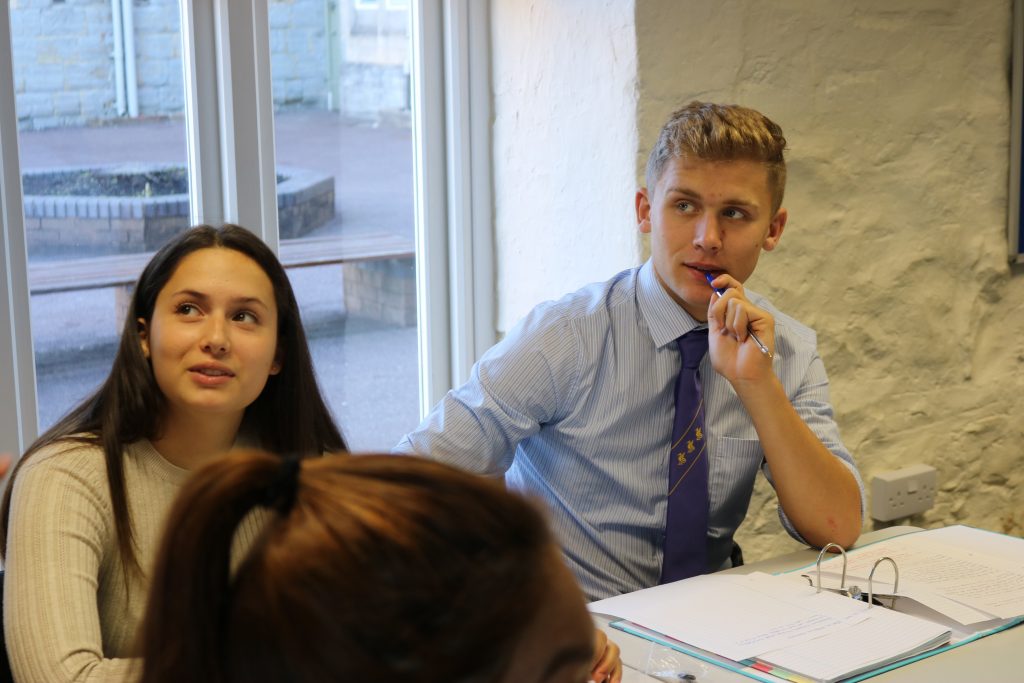
A Level Religious Studies
Overview
Religious Studies at A Level is an exciting opportunity for those who wish to develop their knowledge and understanding of ultimate questions. It gives scope for those who wish to sharpen their own critical approach.
Why Study?
If you are opting for Religious Studies, you will have an enquiring mind and be willing to think, to question and to search. No religious faith is assumed or expected, merely an openness to discover and explore. The subject is open to students following an arts or a mathematical/science-based course of study and will provide useful reflection upon other subject areas.
This specification is designed to:
• Develop a range of transferable skills which can be applied far beyond the study of Religious Studies
• Help students gain a thorough grounding in key philosophical concepts, themes, texts and techniques
• Enable students to develop the ability to reason, form their own judgements, express themselves coherently and contribute to the process of debate
• Show students how to consider philosophical problems through the study of key texts.
As well as learning the essential content, the course aims to also teach and educate on life skills. Topics studied give students a greater awareness of current issues and ethical problems in the world today. This critical analysis, debate and the ability to formulate a persuasive argument allows students to develop skills transferable into the world of work.
Course Overview
• Component 1: Philosophy of religion
• Component 2: Religion and ethics
• Component 3: Developments in religious thought from a Christian perspective
Progression:
Choosing Religious Studies opens up a variety of career paths. This is due to the skills learnt which are adaptable to many essay writing and critical analysis courses including law, humanities subjects and economics. The study of Religious Studies can also be very helpful for those wishing to study medicine or wanting to pursue a career in teaching or caring professions. This is due to the ethics topics which are studied and so form a good base for this area when covered at degree level. Past students have gone on to successfully study PPE, Philosophy, Engineering, Medicine, Theology, Religious Studies and Applied Ethics. Many go on to Oxbridge or Russell group universities.
A Level Sociology
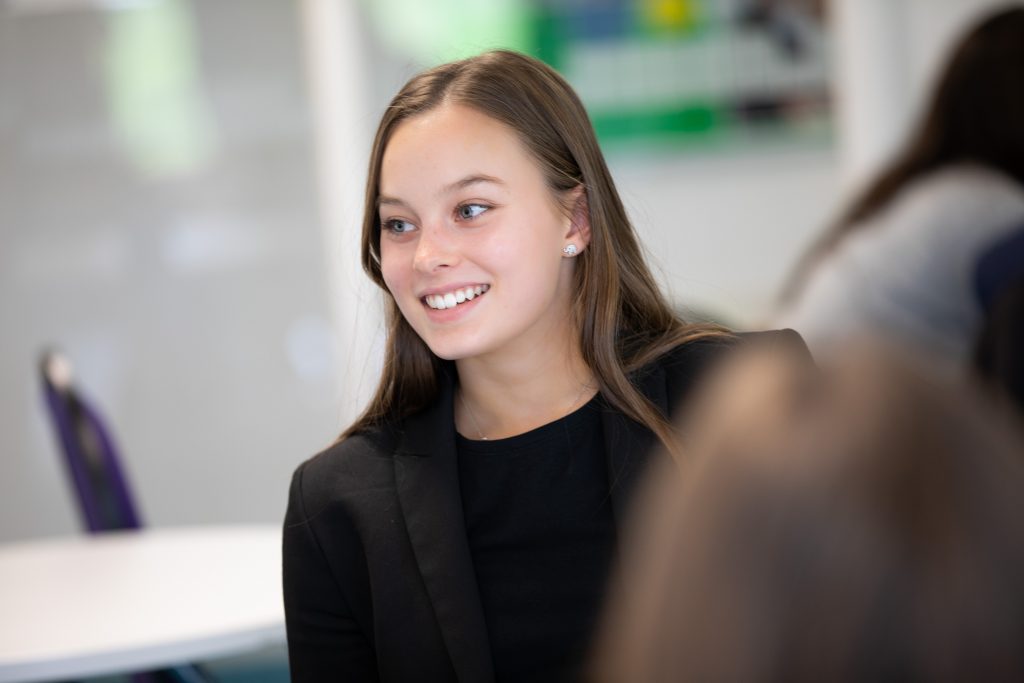
A Level Sociology
Overview
If you like to think about society and question things, then Sociology is for you! It is a subject that encourages you to see the world from different perspectives. Sociology is a good choice for anyone interested in people and the way we live.
Why Study?
Sociology offers a distinct and highly illuminating perspective on human behaviour. Learning to be a sociologist means taking a step back from our own personal interpretations of the world, to look at the social influences which shape our life choices – from when, or whether, to have children to why people abide by or challenge laws. Studying sociology also helps you to understand and appreciate cultural differences and similarities, a very useful skill in our increasingly globalised world. A Level Sociology works well alongside other humanities and social science A Level subjects such as History, Geography and Psychology but also complements the sciences, Business Studies, Economics and art subjects or works within a multidisciplinary approach to A Level choices.
Course Overview
Students will critically evaluate sociological theories in regard to crime and punishment; the changing nature of family, childhood and demography; religion, secularisation and new religious movements such as cults and the New Age; and theories in regard to the
purpose of education and reasons for varied levels of achievement across social groups. All topics are referenced to sociological perspectives, theories, research methods and government social policies.
Assessment:
The A Level qualification consists of three two-hour papers. All topics are examined through short answer questions, stimulus material questions and essays, requiring knowledge of research methods, sociological theories and perspectives.
Progression
As a subject, sociology has universal currency and is well represented in higher education, the majority of universities offer three year degree courses allowing students to gain a BSc or BA in Sociology, often combining it with Criminology, Psychology or other related subjects. Sociology A Level is an excellent preparation for degrees in Sociology, Psychology, Criminology, Law, History, Theology,
HSPS, PPE, Archaeology & Anthropology, Social Work, International Relations, Development Studies, Media Studies, Marketing and Business Studies. The study of sociology as the main element or as part of a combined degree at university can lead into careers in the civil service, police, military, politics, lobbying, social work, healthcare, teaching, the media and business.
BTEC Sport
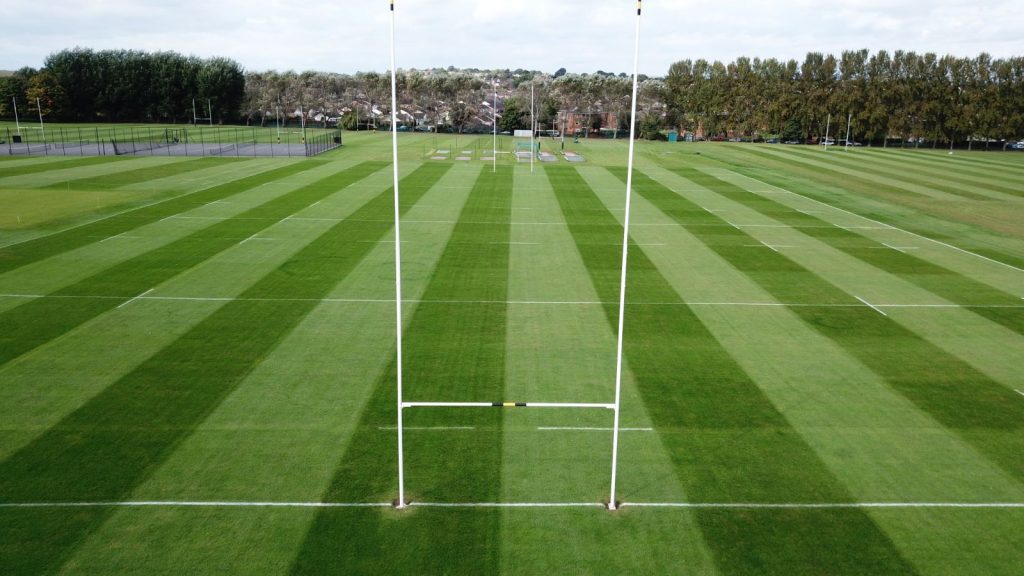
BTEC Sport
Overview
BTEC Level 3 National Extended Certificate in Sport is a widely recognised qualification by industry and higher education as the signature vocational qualification at Level 3. BTEC qualifications provide progression to the workplace either directly or via study at a higher level. YouGov research shows that 62% of large companies have recruited employees with BTEC qualifications. Studying BTEC Level 3 National Extended Certificate in Sport is equivalent in size to one A Level. It is expected that students should have a keen interest in sport, be passionate about coaching and sports leadership and be playing in at least one major sport at Queen’s College.
Why Study?
BTEC is a vocational qualification meaning that is very much suited towards developing the skills to be ready to enter the place of work. Unlike the traditional route of A level and examinations. BTEC qualifications are modular and therefore assessment standards are often coursework/project based assignments throughout the year with opportunities to develop grades and get some feedback.
Course Overview
Course information and assessment:
The course is assessed through a variety of methods including examinations and coursework style assessments. There is a practical element to the course and unlike GCSE there is no performance assessment.
The course has four units:
• Anatomy and Physiology (examination in January of Year 12)
• Sport Psychology (coursework assignments completed in Year 12)
• Fitness training and programming for health, fitness and well-being (examination in Year 13)
• Professional development in the sports industry (coursework assignments completed in Year 13)
Progression
A huge percentage of students completing a BTEC in Sport often go to university to study a sport based degree such as, Sports Performance, Sports Science or Sports Coaching. The BTEC is also a great starting place for going into the workplace and completing an apprenticeship or other qualifications on the job to become a fitness instructor or sports coach for example.
To view all Sport and Physical Education information
A Level Textiles
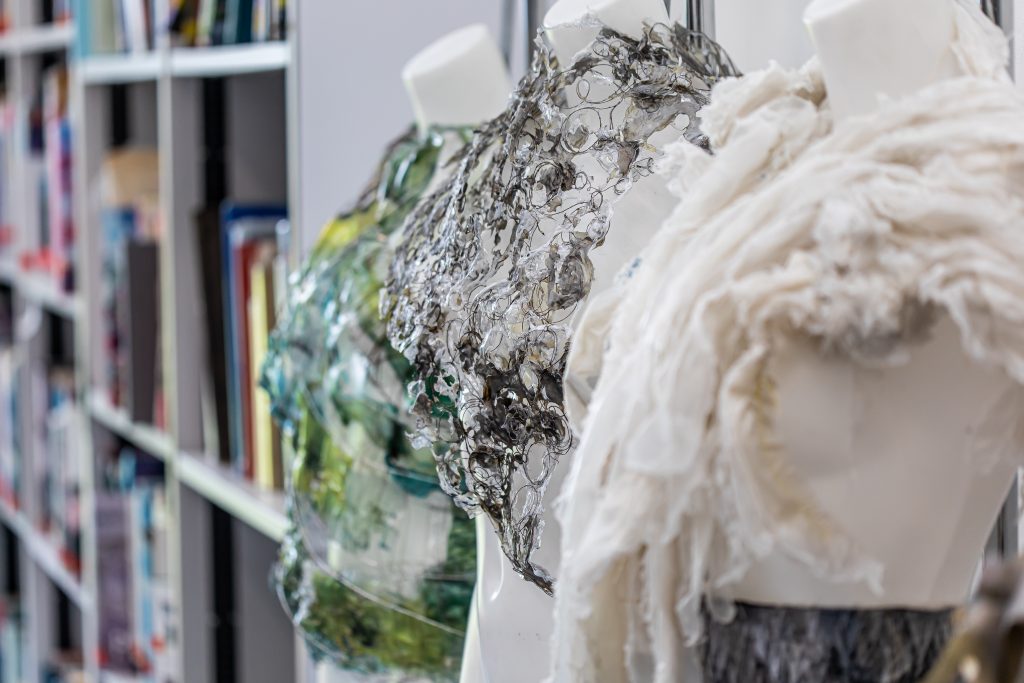
A Level Textiles
Overview
Creativity is becoming one of the most important skills in today’s society. The future is constantly changing to adapt to developing technology and a pupil’s ability to think creatively and innovatively is increasingly important. The Drama and Art Building at Queen’s College offers some of the best facilities in the South West. The spacious, superbly lit studios offer specialist teaching facilities for fine art, printmaking, photography, textiles and ceramics. There are well-equipped rooms for GCSE pupils whilst each A Level pupil has their own exhibition and working space. Head of Department, Rebecca Cade, Teachers of Art, Laura Burgoyne and Sandra Spall, and the Art Technician, Alison Luisi, have specialisms in Textiles, Painting, Printing, Ceramics and Mixed Media, and are all practising artists.
Why Study?
Textiles is a well-established and exciting course which has been introduced to offer pupils the opportunity to gain the essential skills required to pursue a career path within the creative industries. The most essential requirement of the course is a passion for the subject and a desire to explore the creative and expressive use of materials. Students study methodologies with emphasis placed on innovation and experimentation, inspired by contemporary textiles. A Level Textiles opens the door to higher education, and leads to careers in Textile, Fashion, Interior Design, Photographic and Fashion Styling, Fashion Prediction, Fashion Illustration and Jewellery and Costume Design.
Course Overview
The A Level course builds upon knowledge, understanding and the development of skills through research, drawing, design development and critical and contextual understanding. You will generate practical work, ideas and research from primary and contextual sources and then present your outcomes based on themes developed from personal starting points. In the second year of the course
there are two linked elements, each with separate final outcomes – practical work and personal study. The development of these is shown through supporting studies; your innovation and creativity will be essential as will be your own, strong, personal identity. The externally set assessment is based on one broad-based thematic starting point and plenty of guidance is given to you through the preparatory period.
Progression
A University course in a creative subject will require the creation of a portfolio. Taking 1 or more of our A Level subjects will prepare them or this stage, and we will support them with this. Students’ progress to a wide range of design-led disciplines following the Textiles A Level including Textile & Fashion Design, Costume Design, Ceramics, Graphics and Illustration. Students may also progress to Events Management and Business Studies related to the creative industries.
EPQ (Extended Project Qualification)
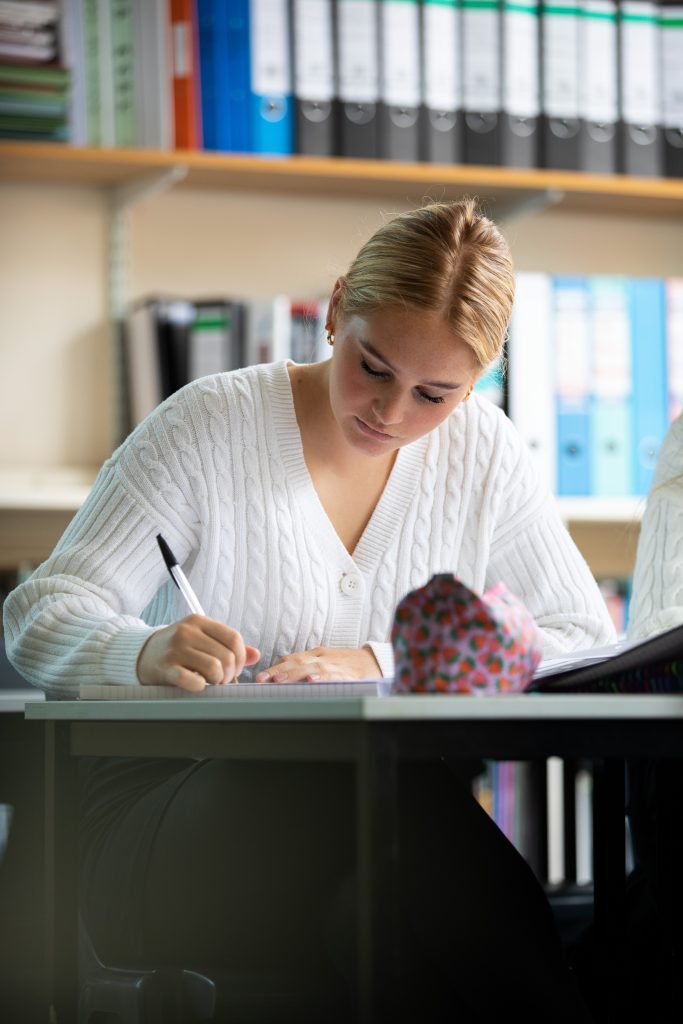
EPQ (Extended Project Qualification)
What is an EPQ?
The Extended Project Qualification (EPQ) is an AS level equivalent standalone qualification designed to extend and develop students’ abilities beyond the A-level syllabus and prepare for university and future careers. The EPQ is an exciting opportunity offered to and taken
up by most pupils in Year 12. There can be two routes through the EPQ: a formal 5000 word essay or the creation of an artefact accompanied by a 1000 word essay. The choice of topic is indeed endless and varied.
Why should I take an EPQ?
The qualification was the brainchild of several universities who aimed to improve the quality of their undergraduate admissions. As such, it is highly respected and pupils who undertake the EPQ are typically offered lower grades for university admission and also find the transition from school to higher education much smoother. The EPQ allows students to learn new skills, such as independent researching, referencing and assimilating a large amount of information for the completion of their projects.
Overview
Pupils will either have a burning interest in a particular subject or want to extend their knowledge or perhaps an aspect of their A- Level course that has piqued their imagination. Recent years have seen pupils focus on serial killers, climate change, prison reform, reminiscence therapy for those with Alzheimer’s, disaster relief and why some people participate in sport, to name but a very few. The artefact route has seen some imaginative and awe inspiring creations including making a wedding dress out of parachute silk, designing an eco-friendly house, recycling surf boards, making a biogas converter and even creating a pizza oven in their own garden. Alongside their artefact or essay, the pupils are expected to complete a production log which is essentially a diary or blog of their EPQ journey and this is done in stages as they move through their project. All students have to deliver a presentation of their EPQ at the end, before evaluation of their project.






